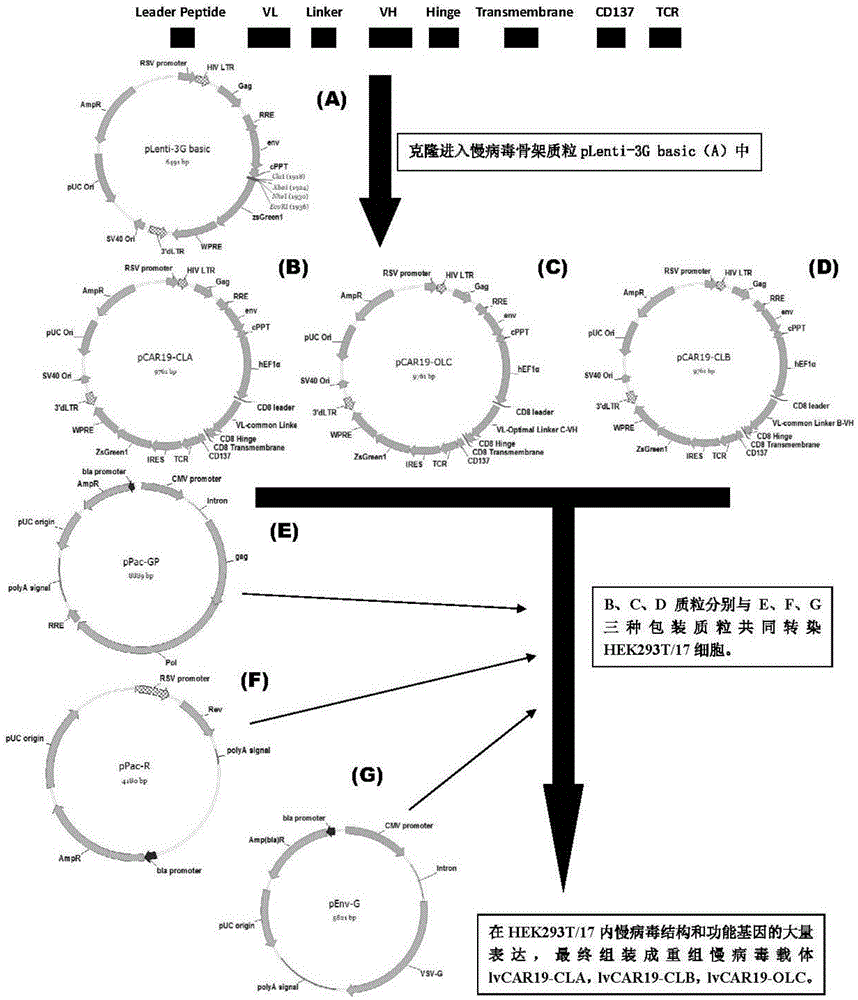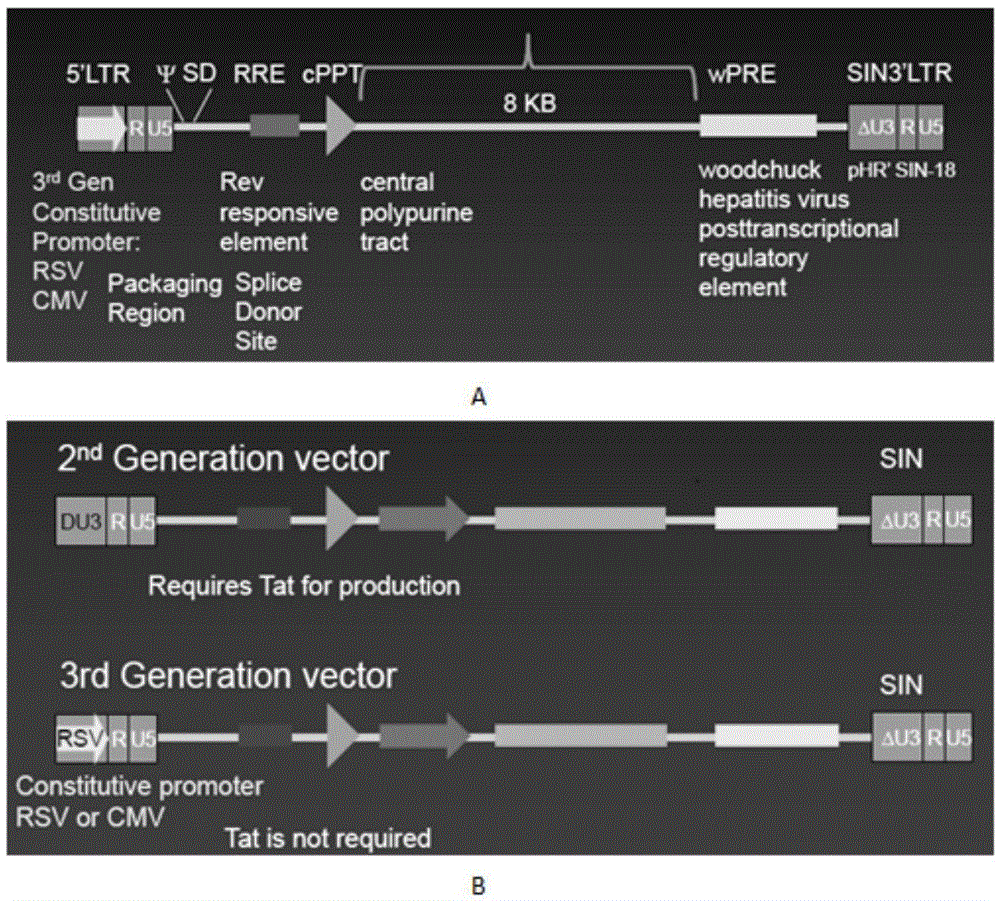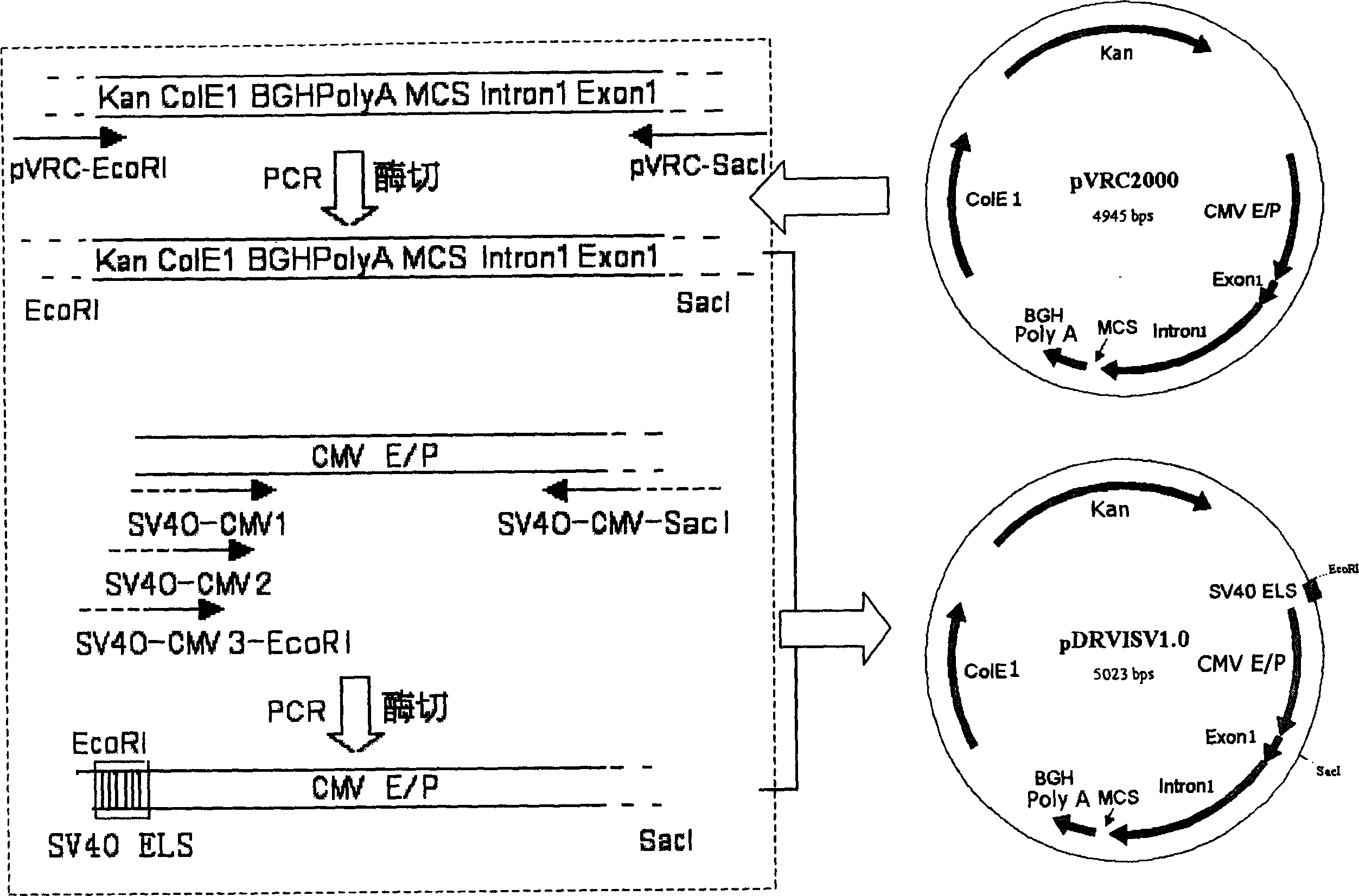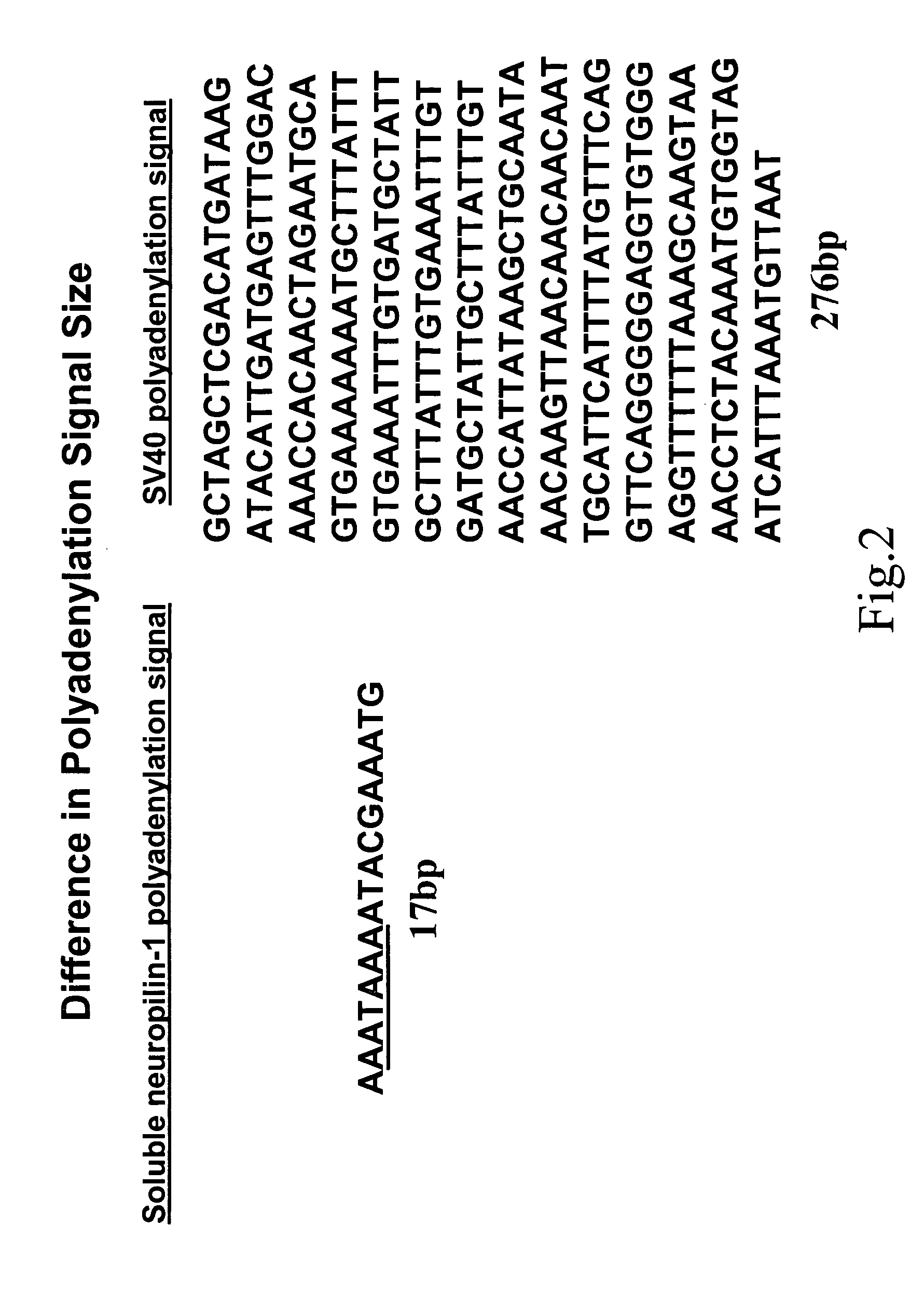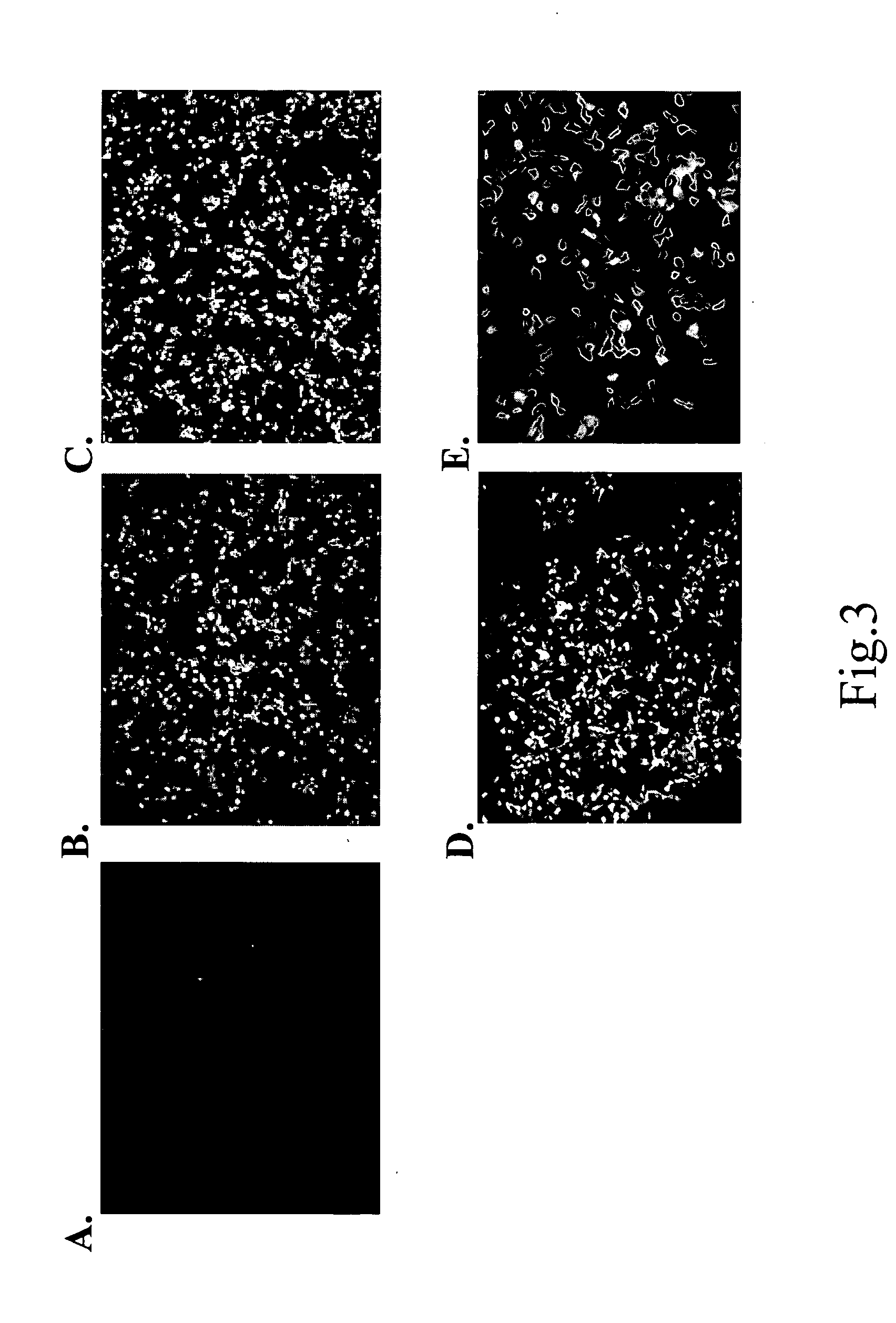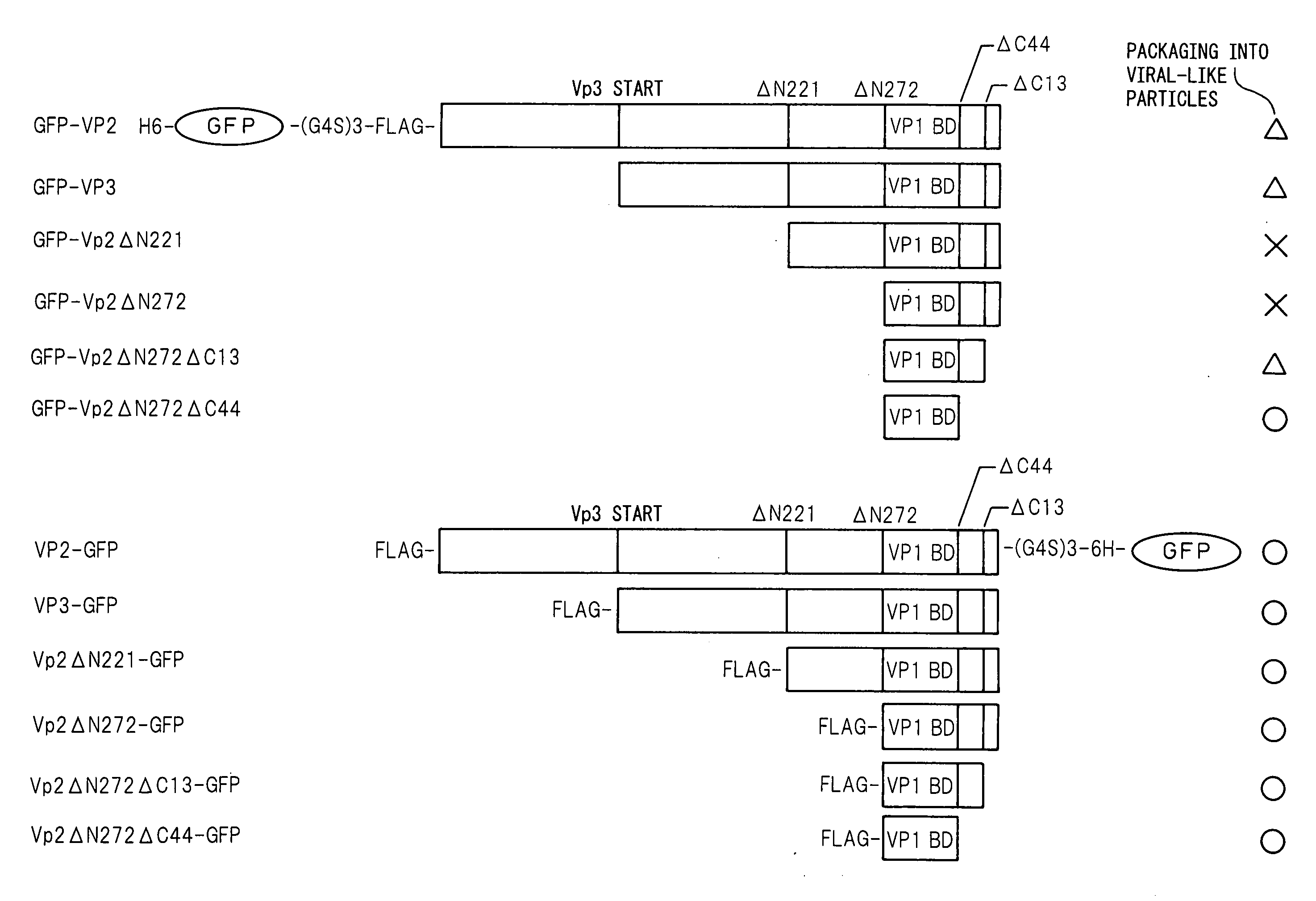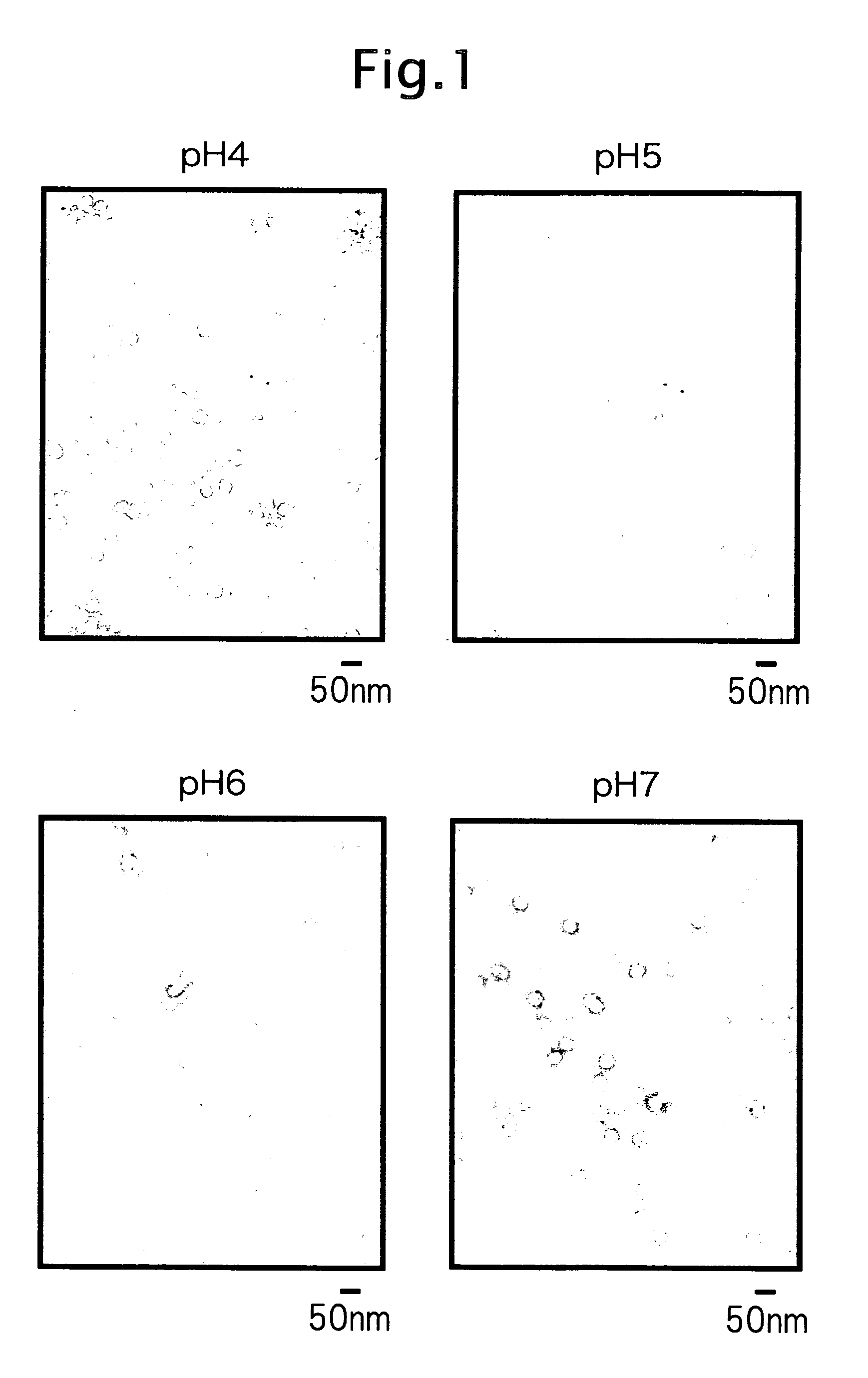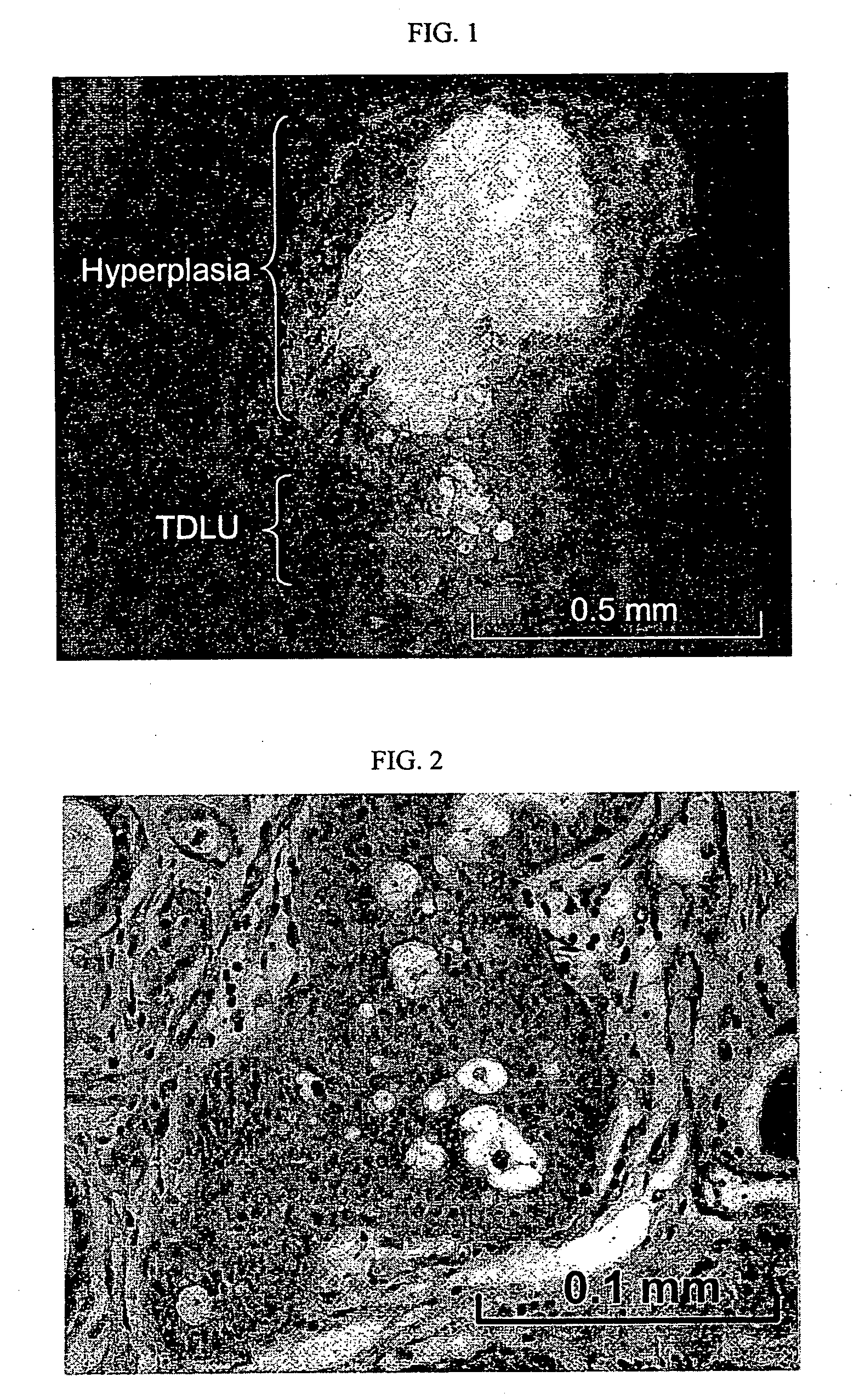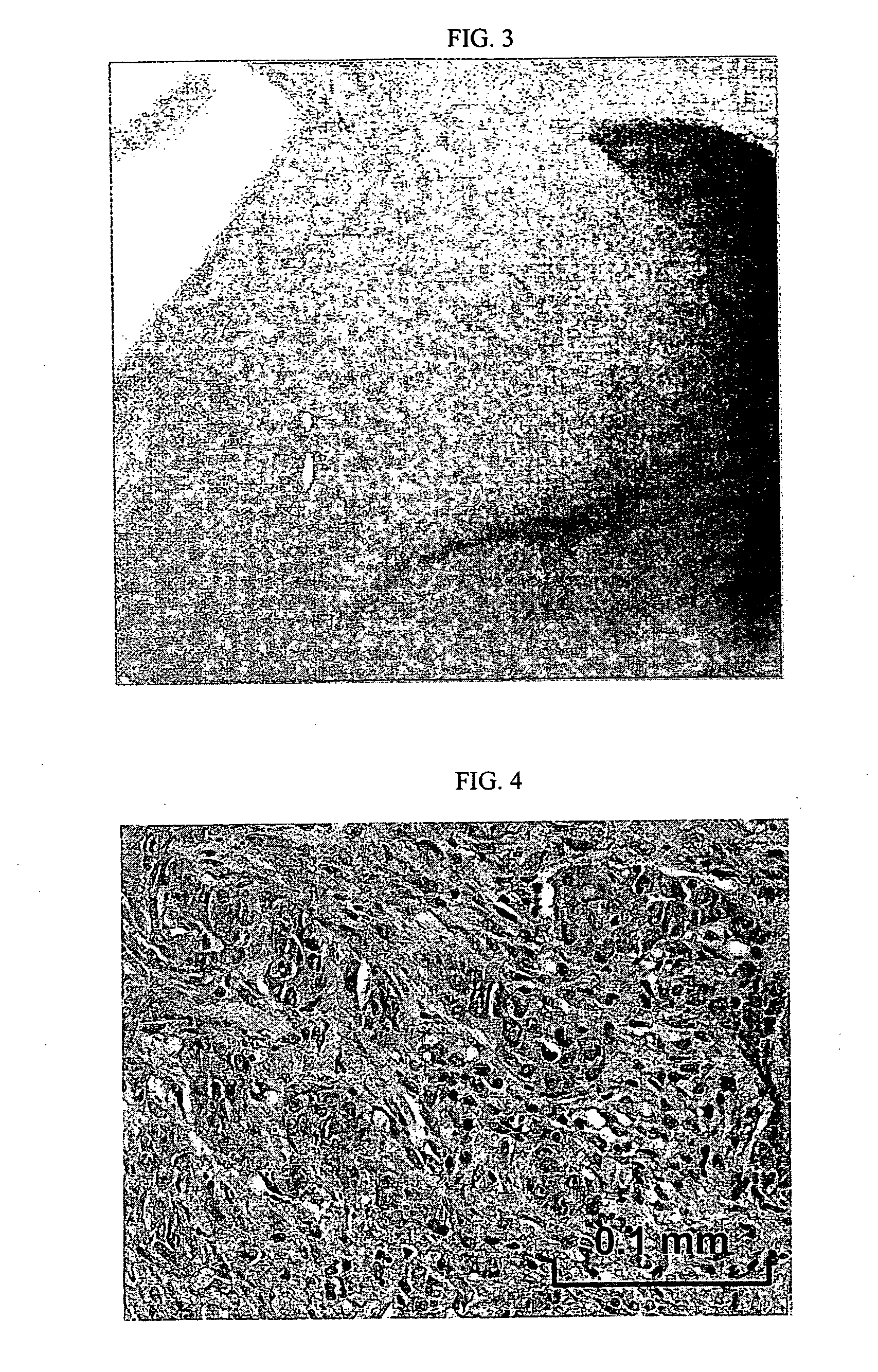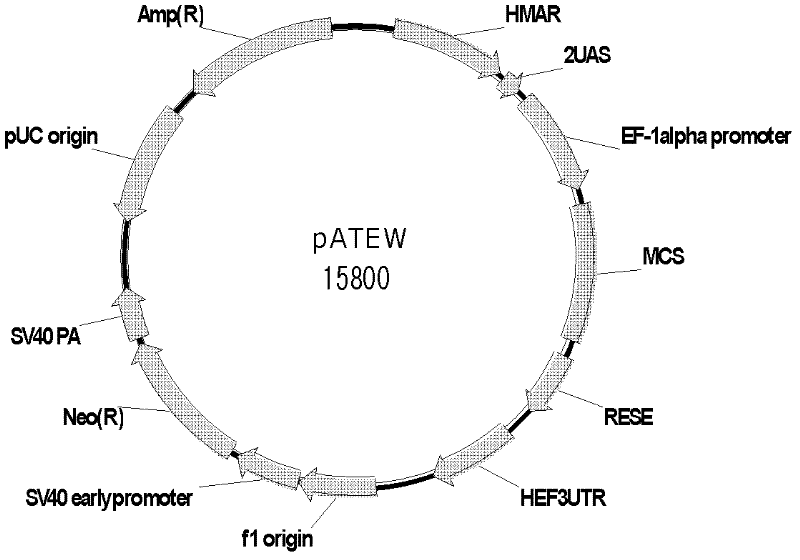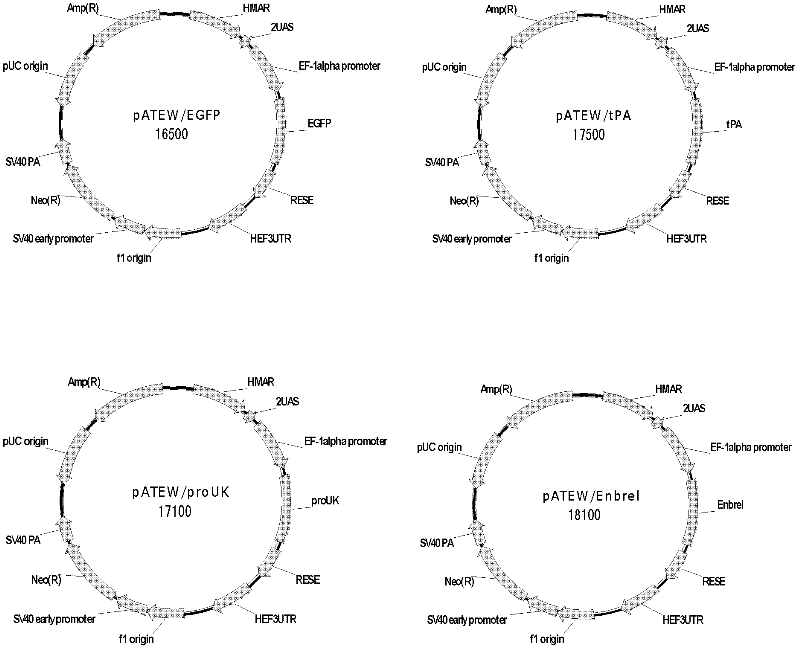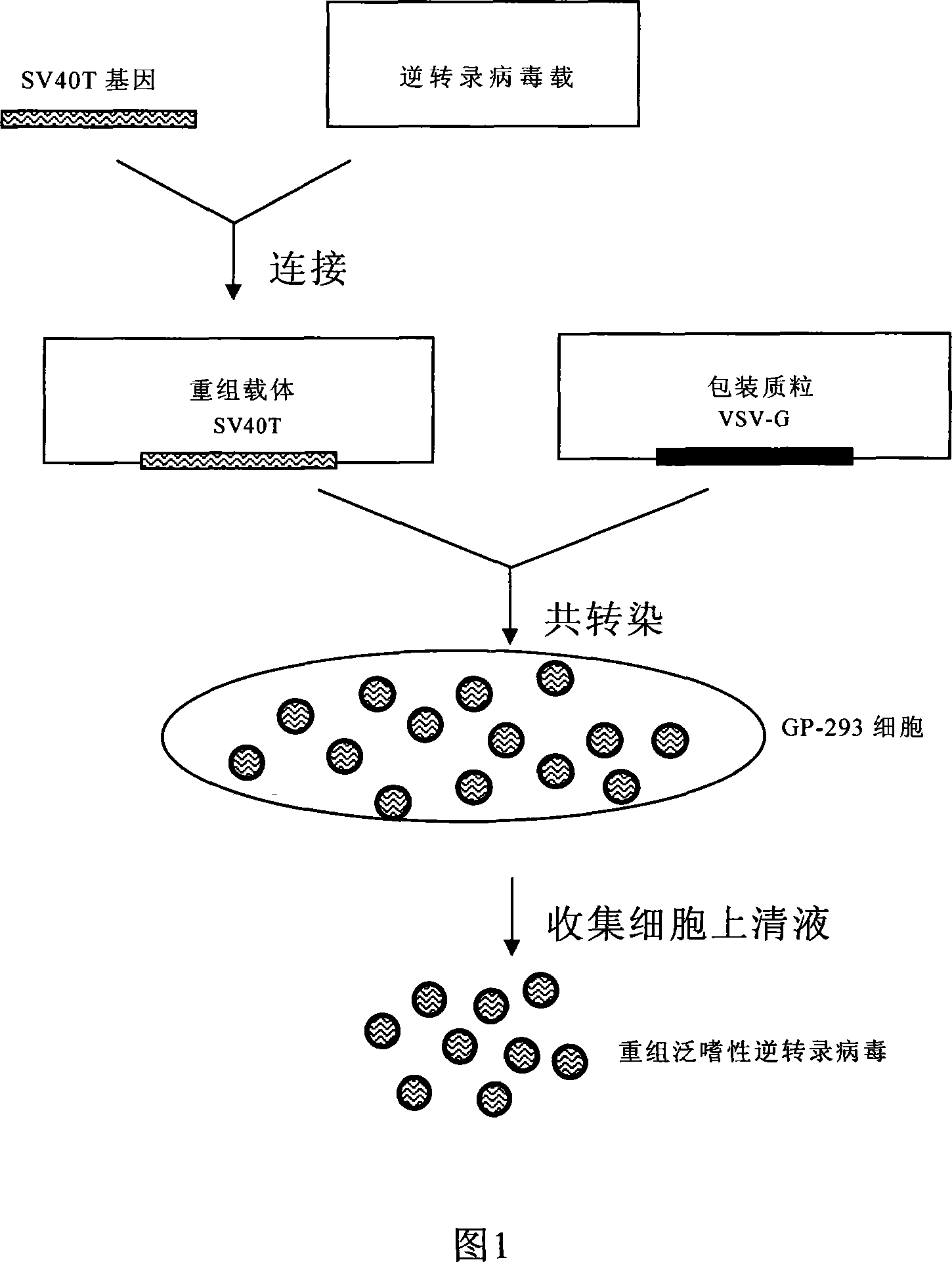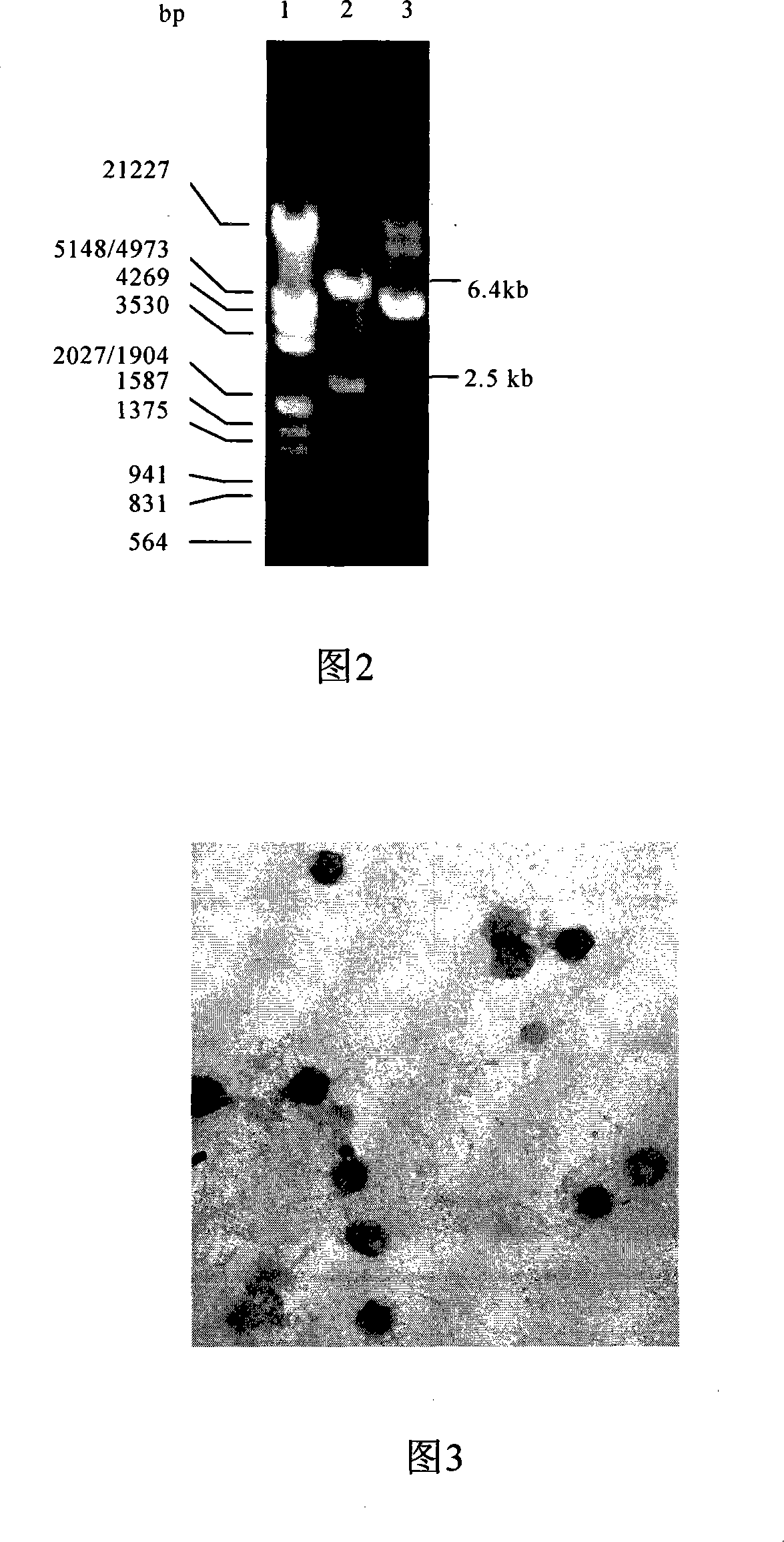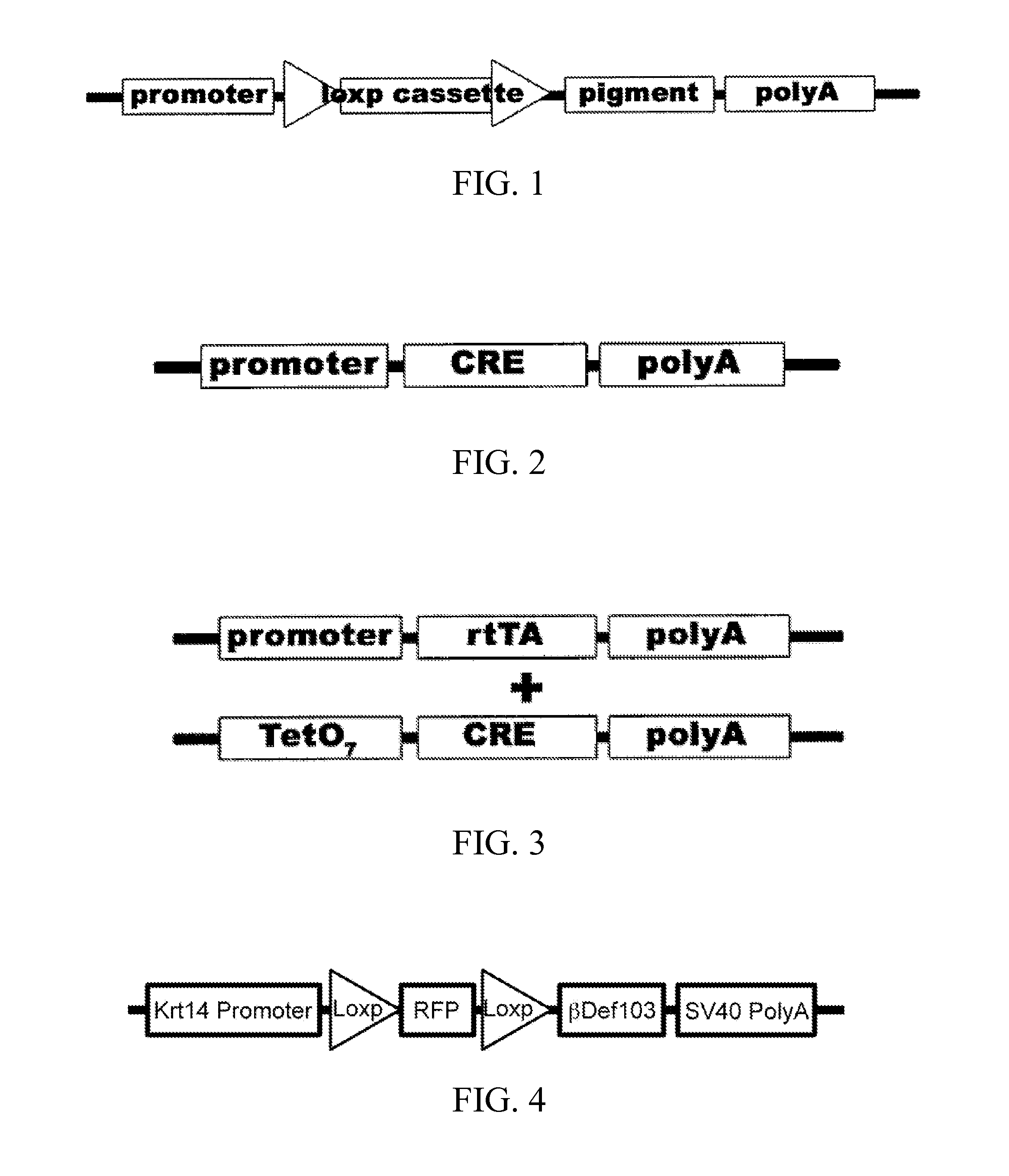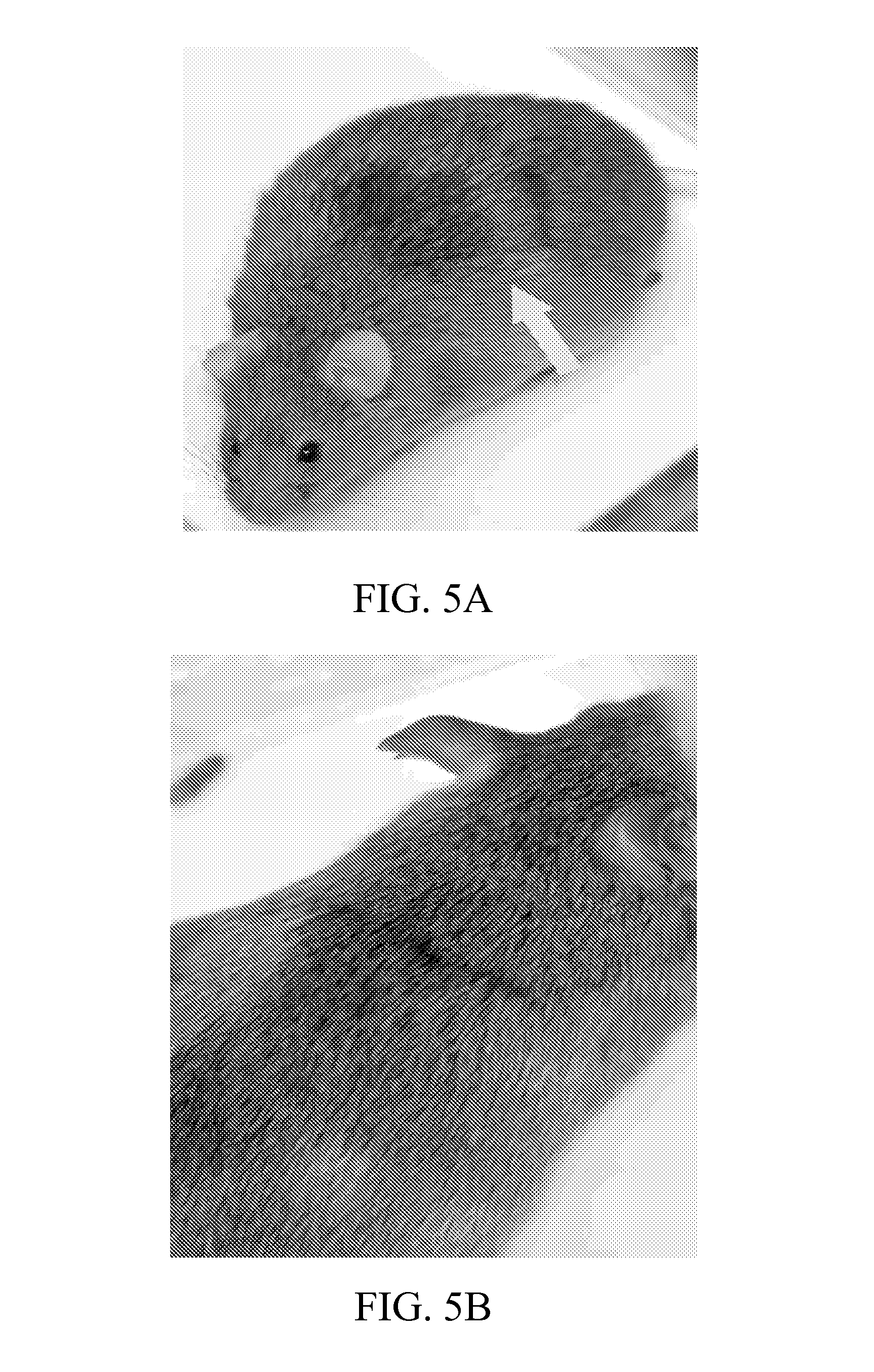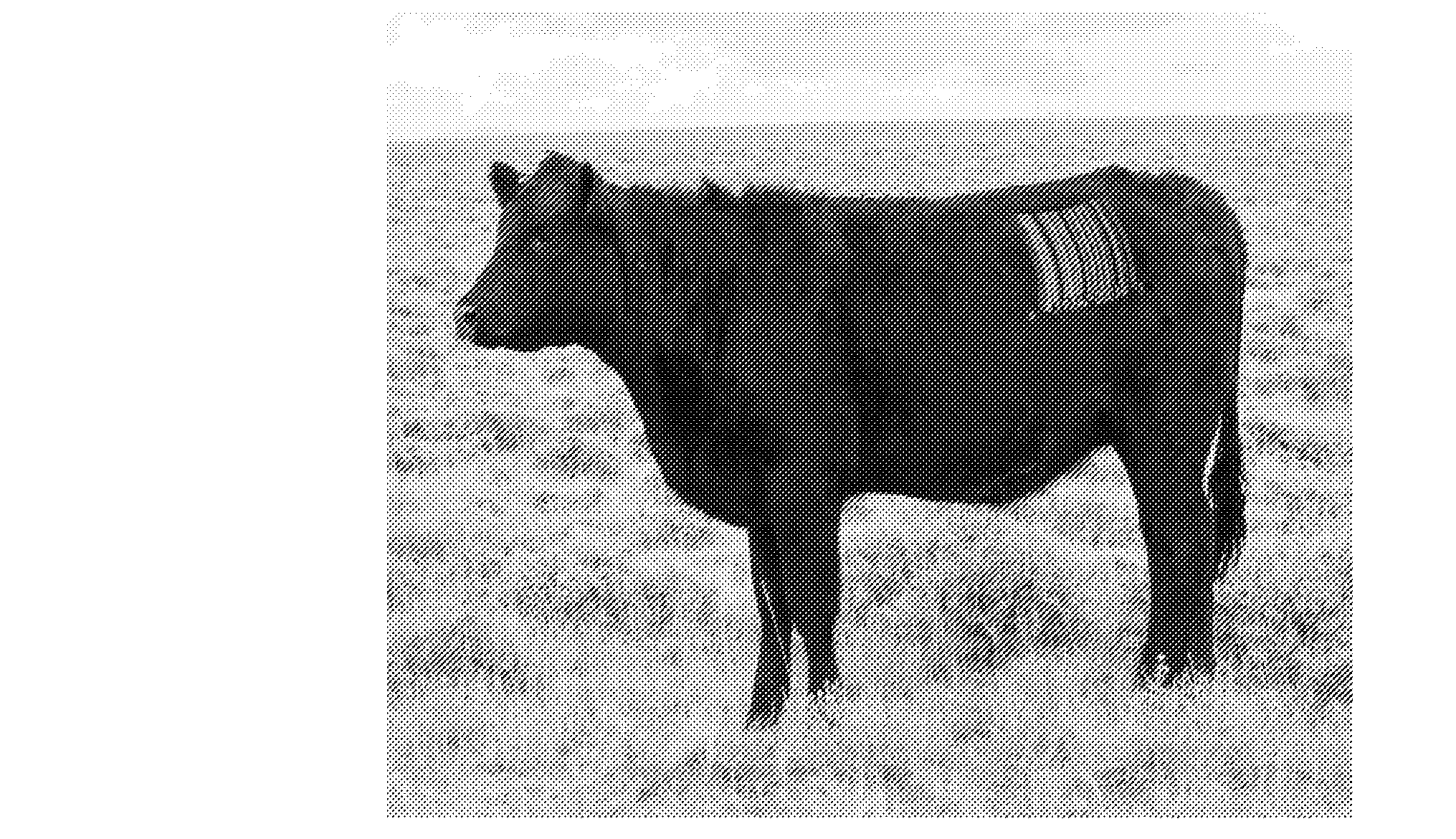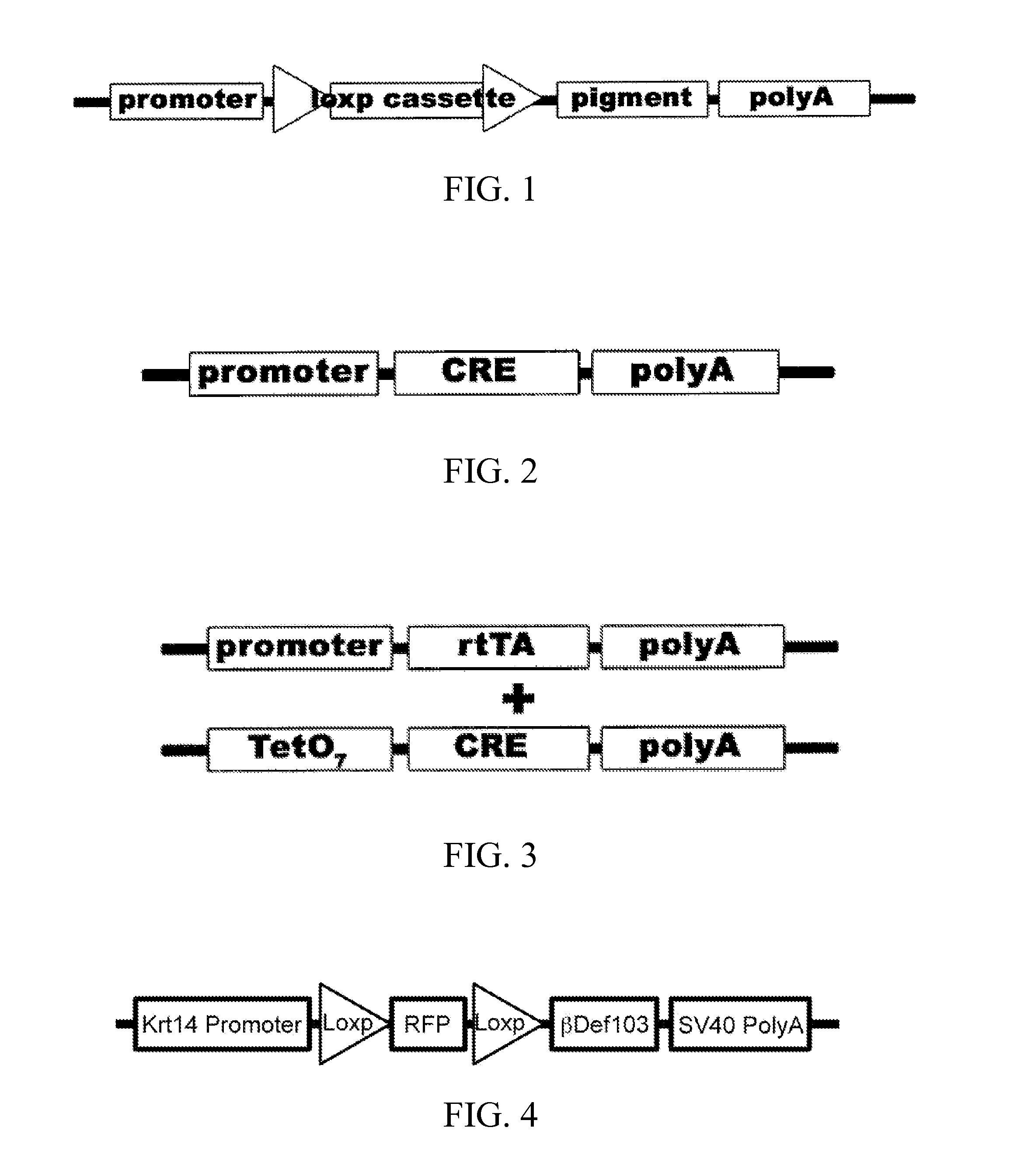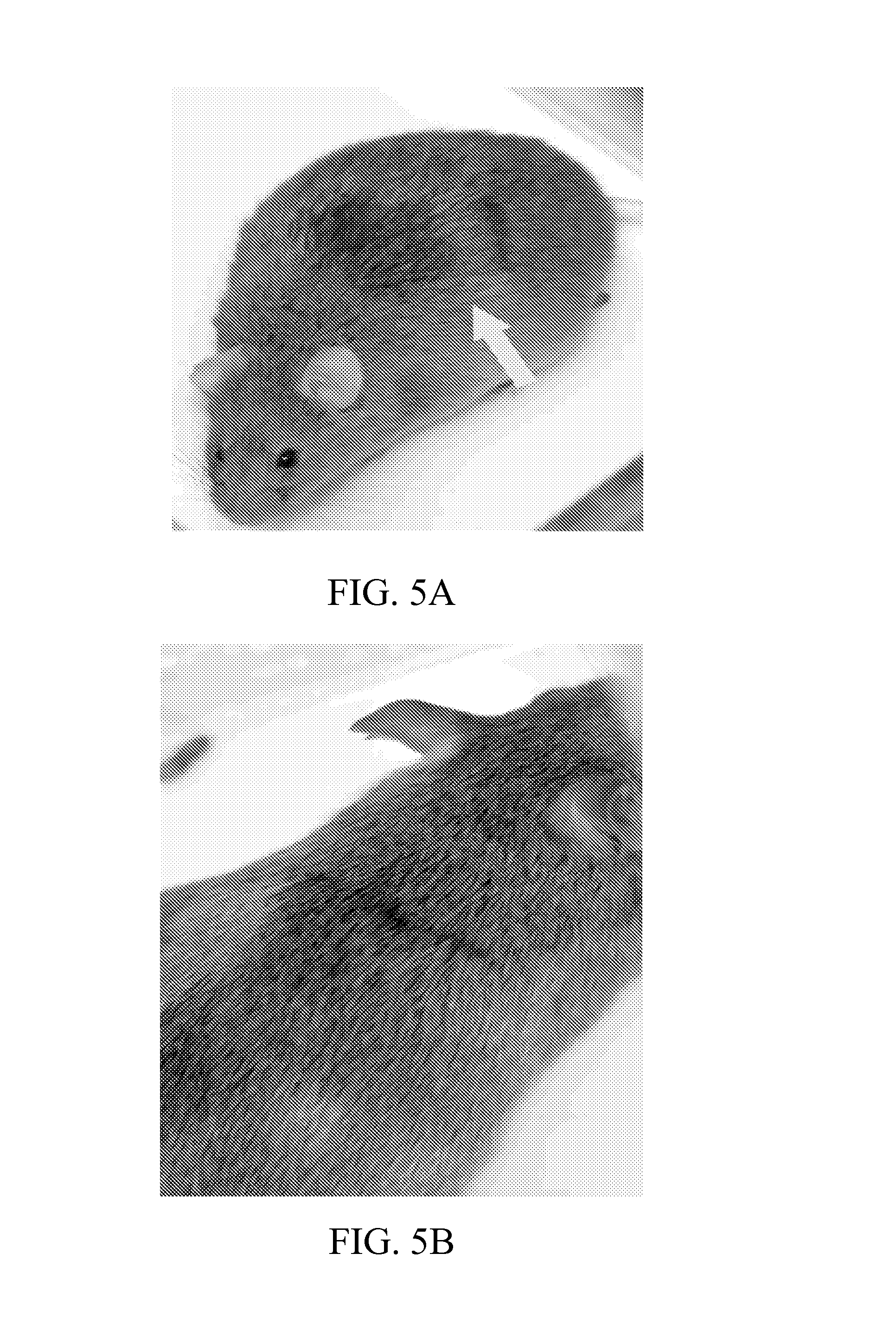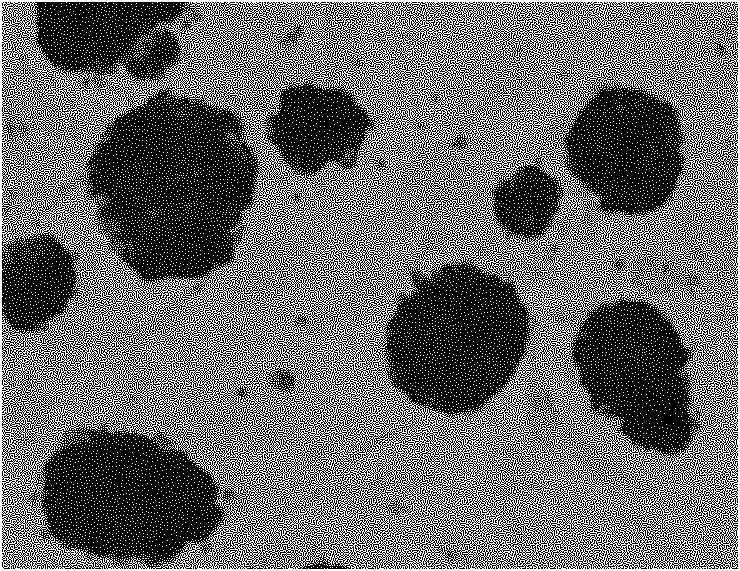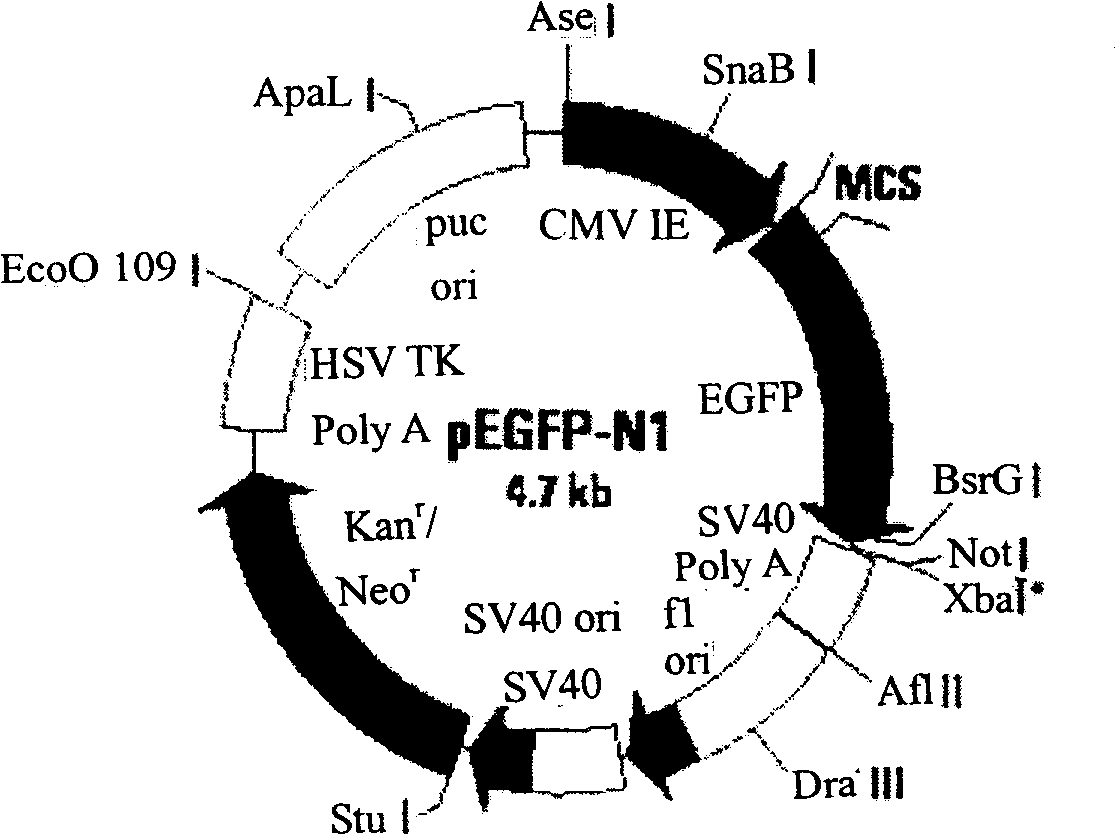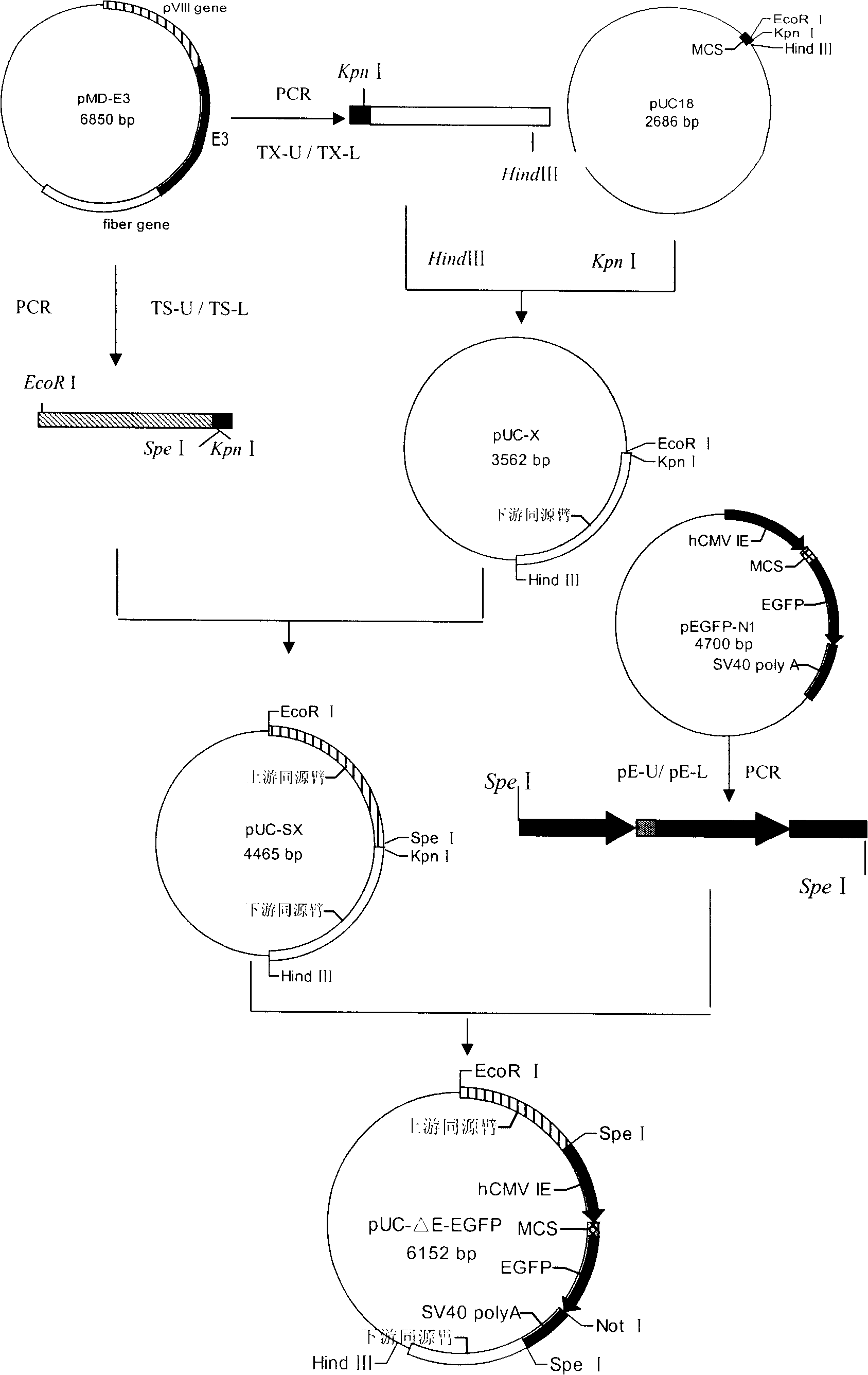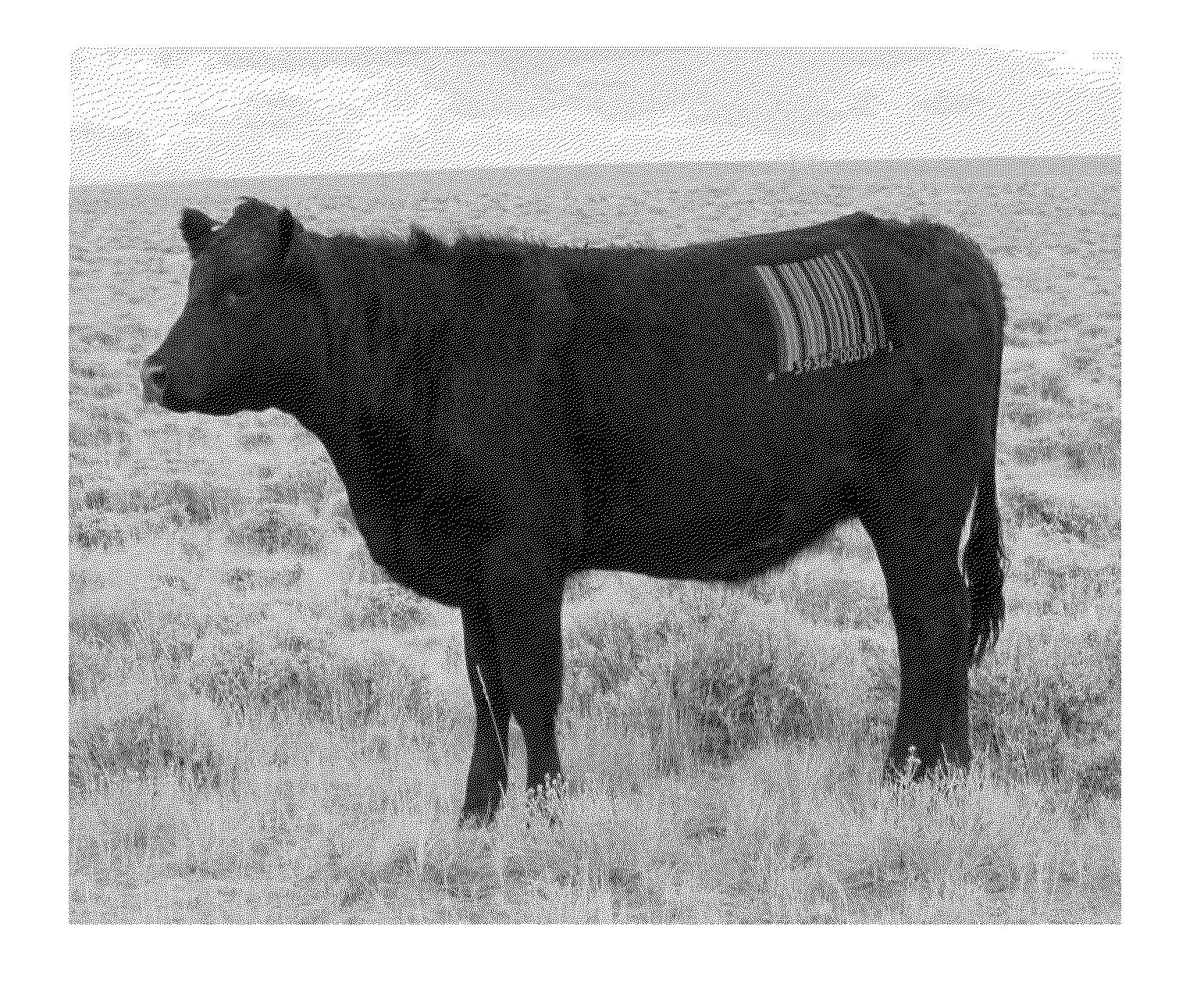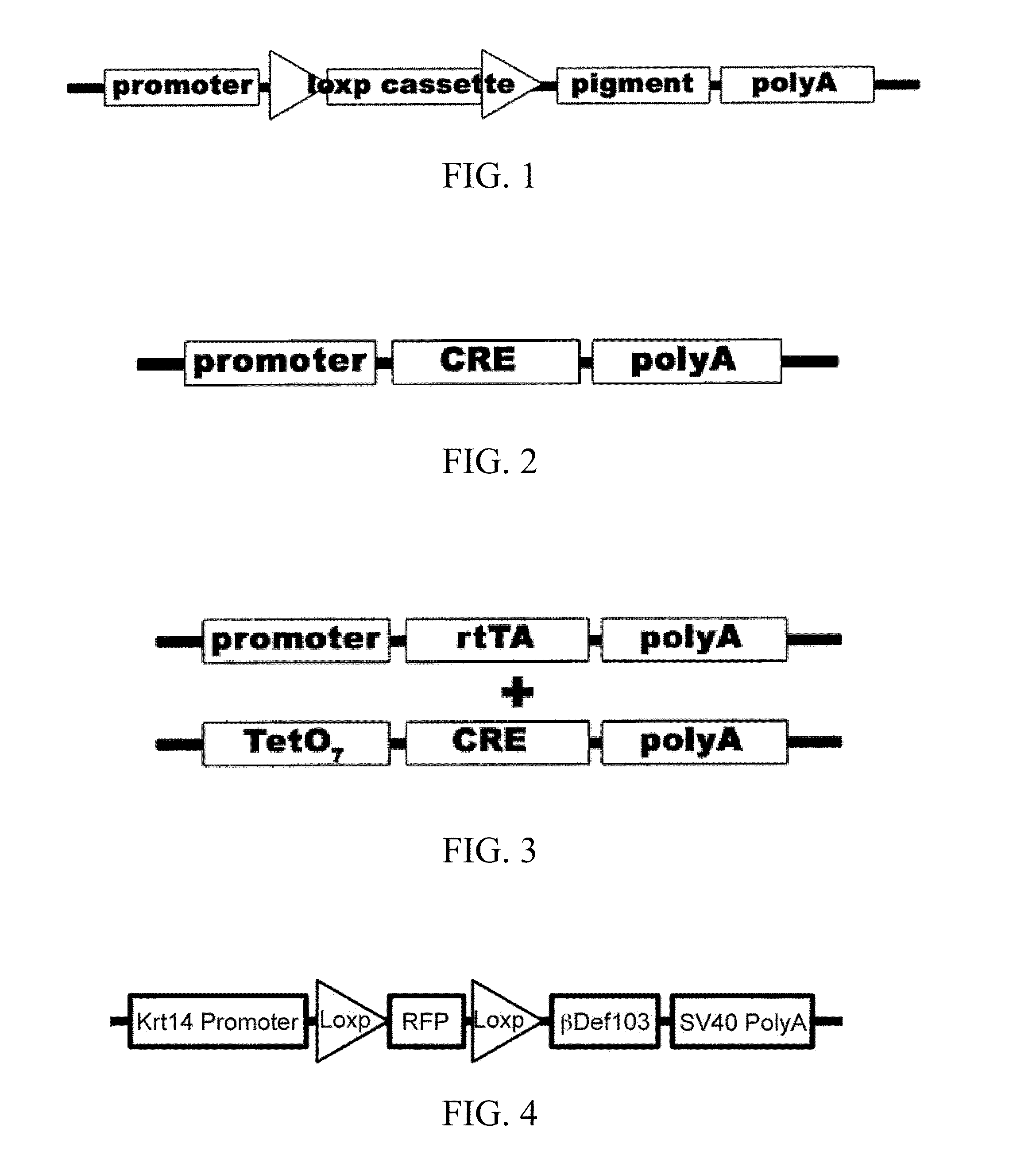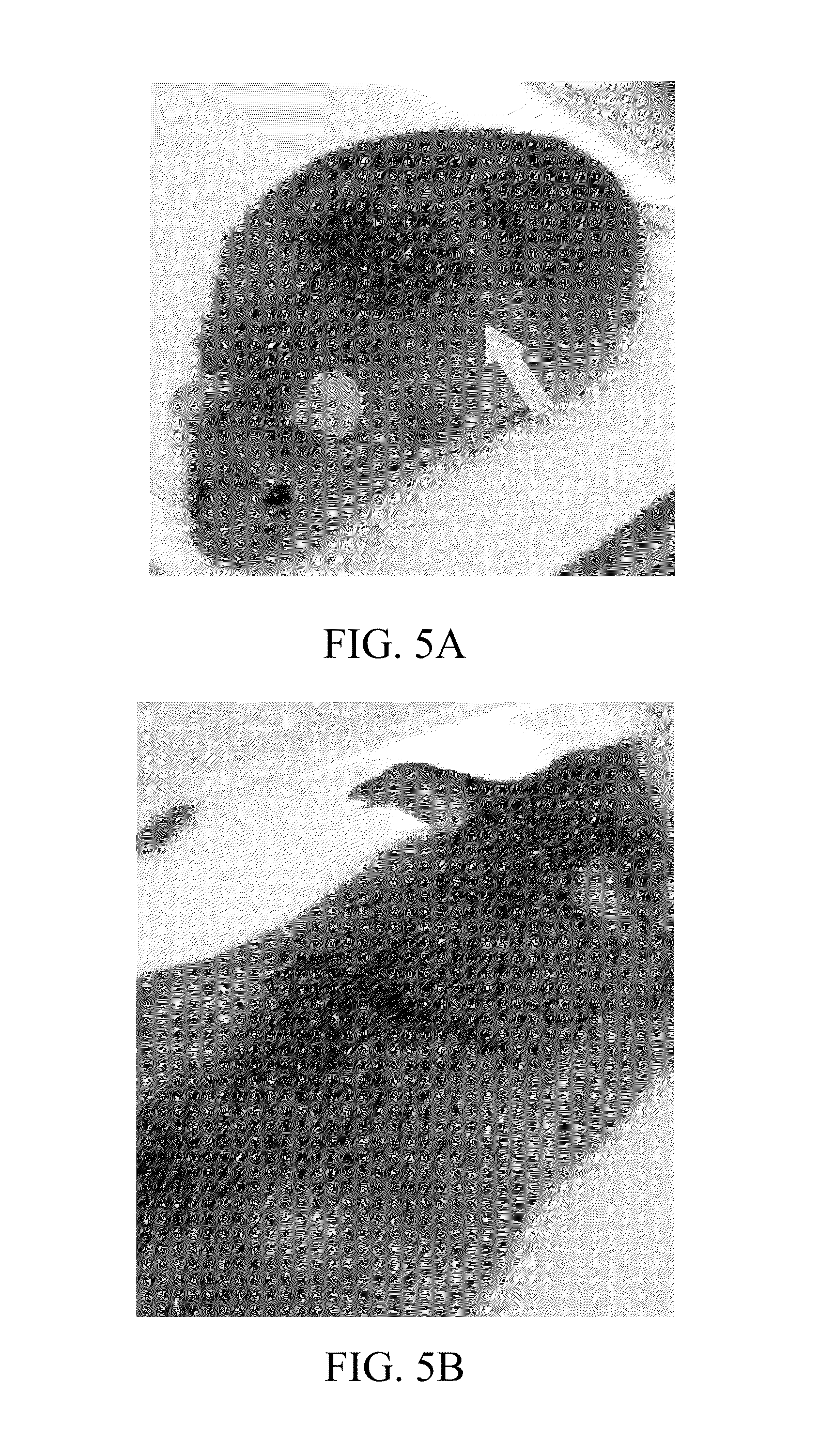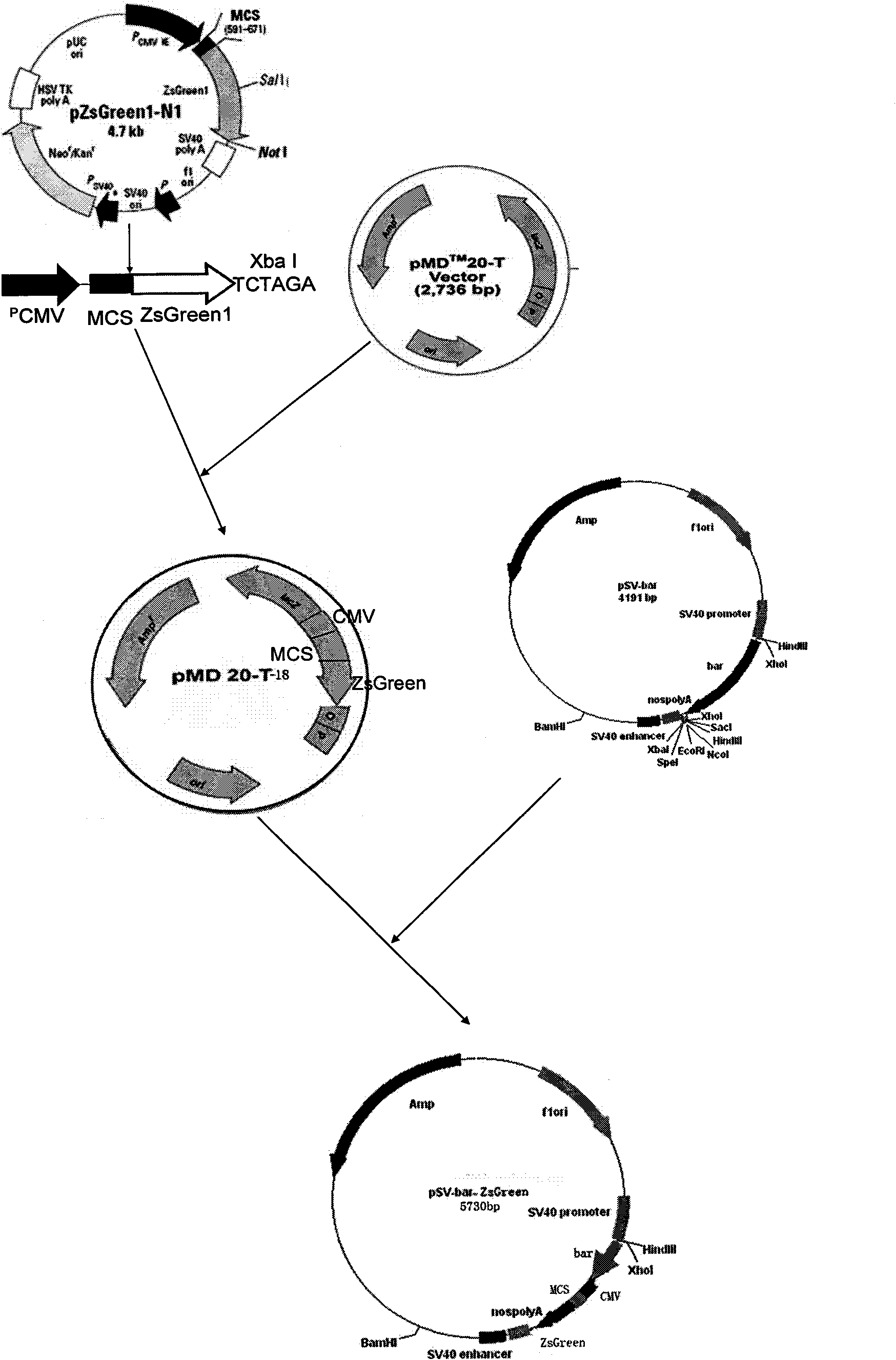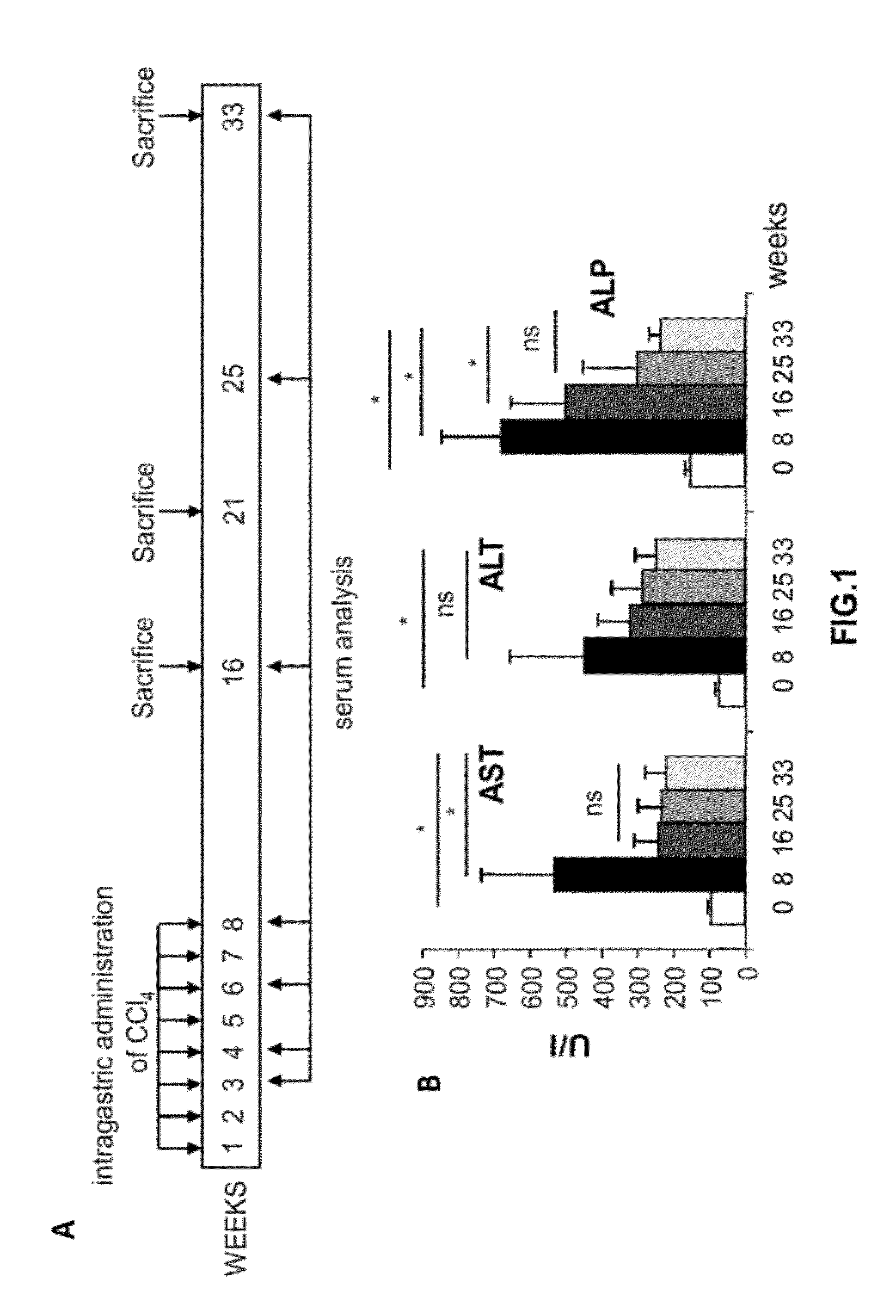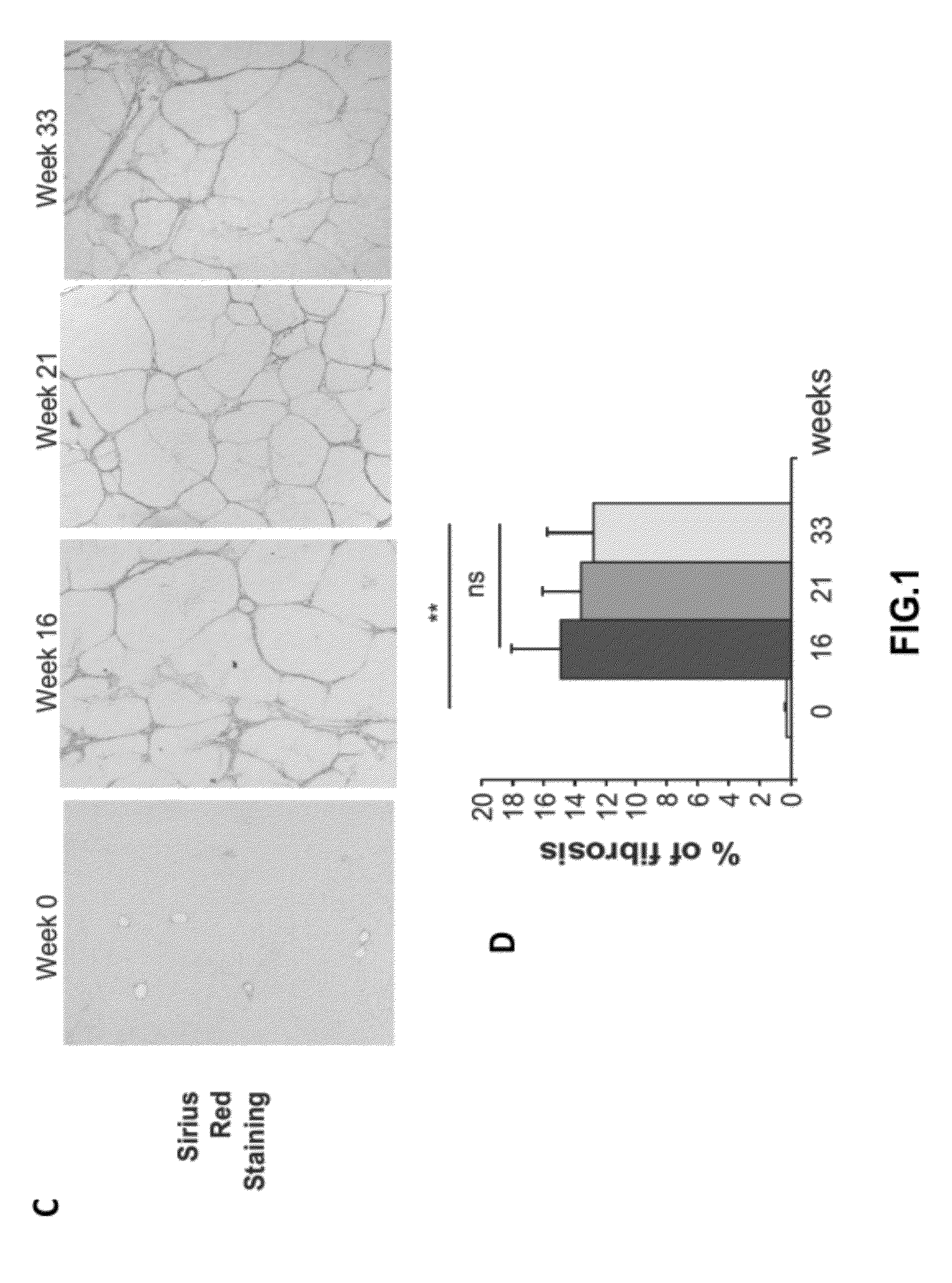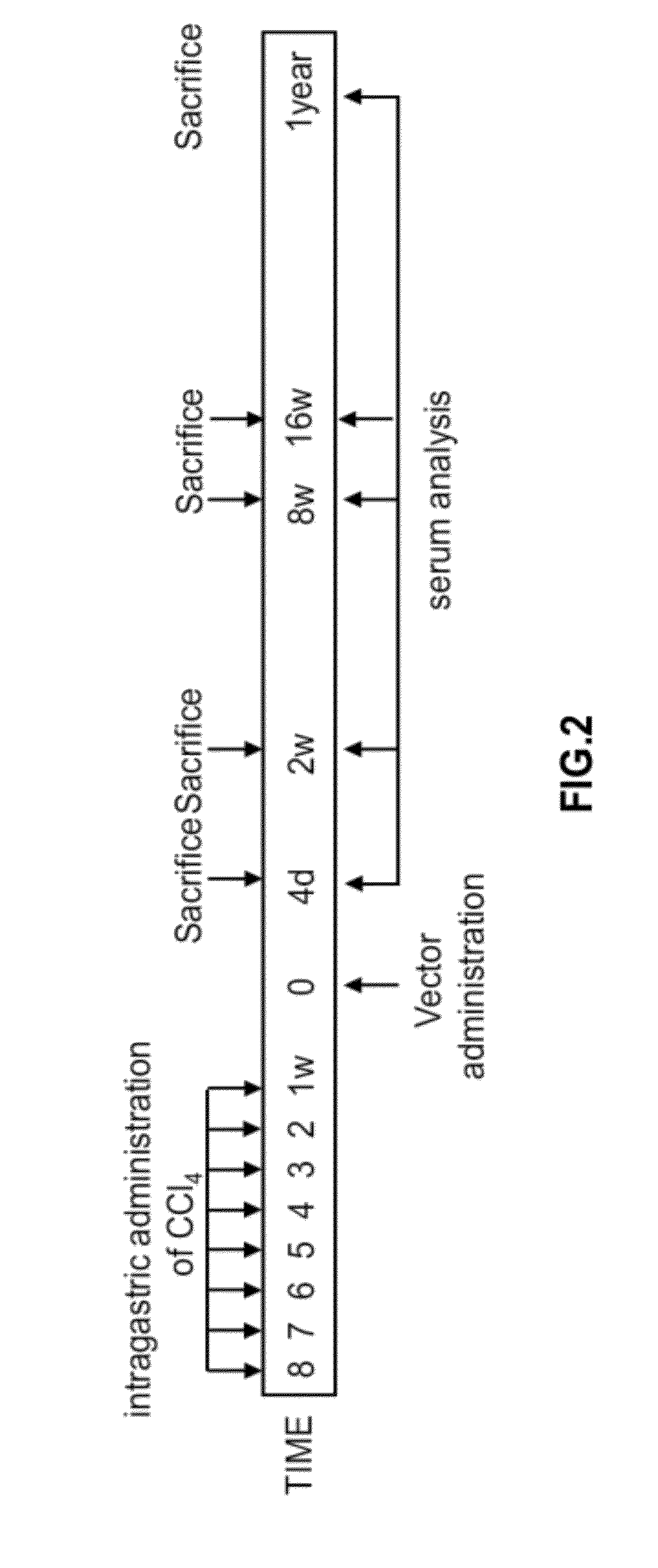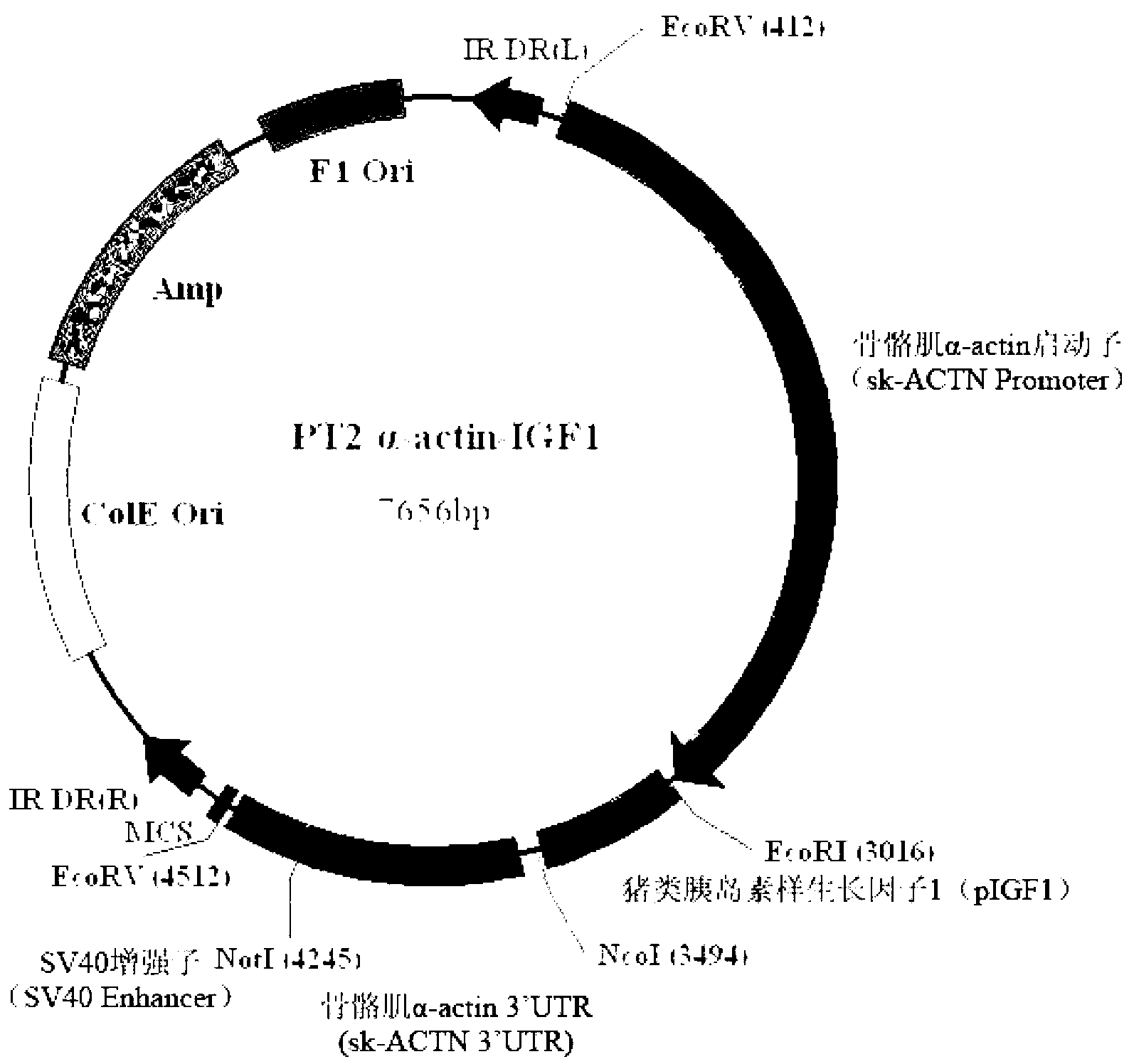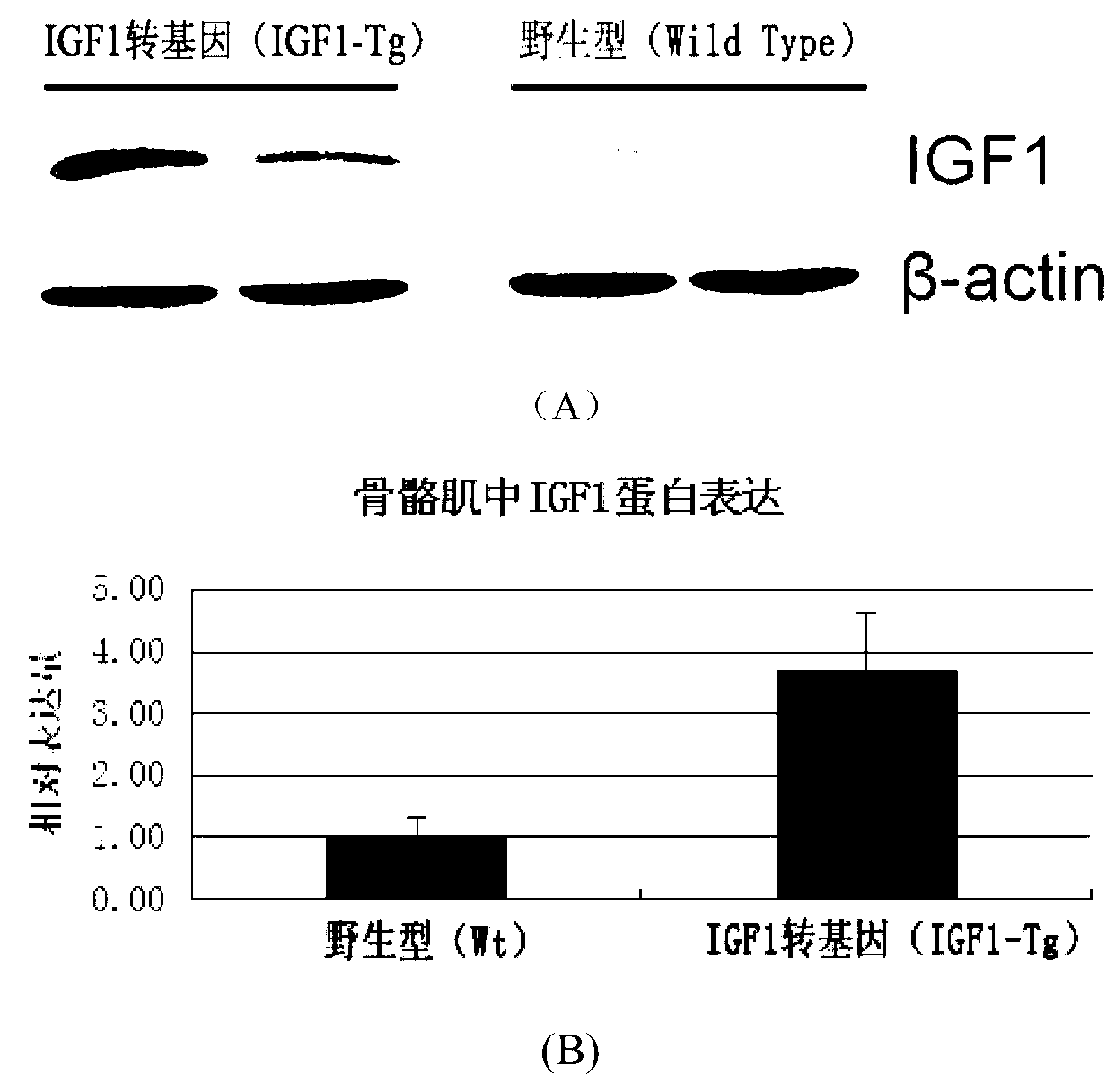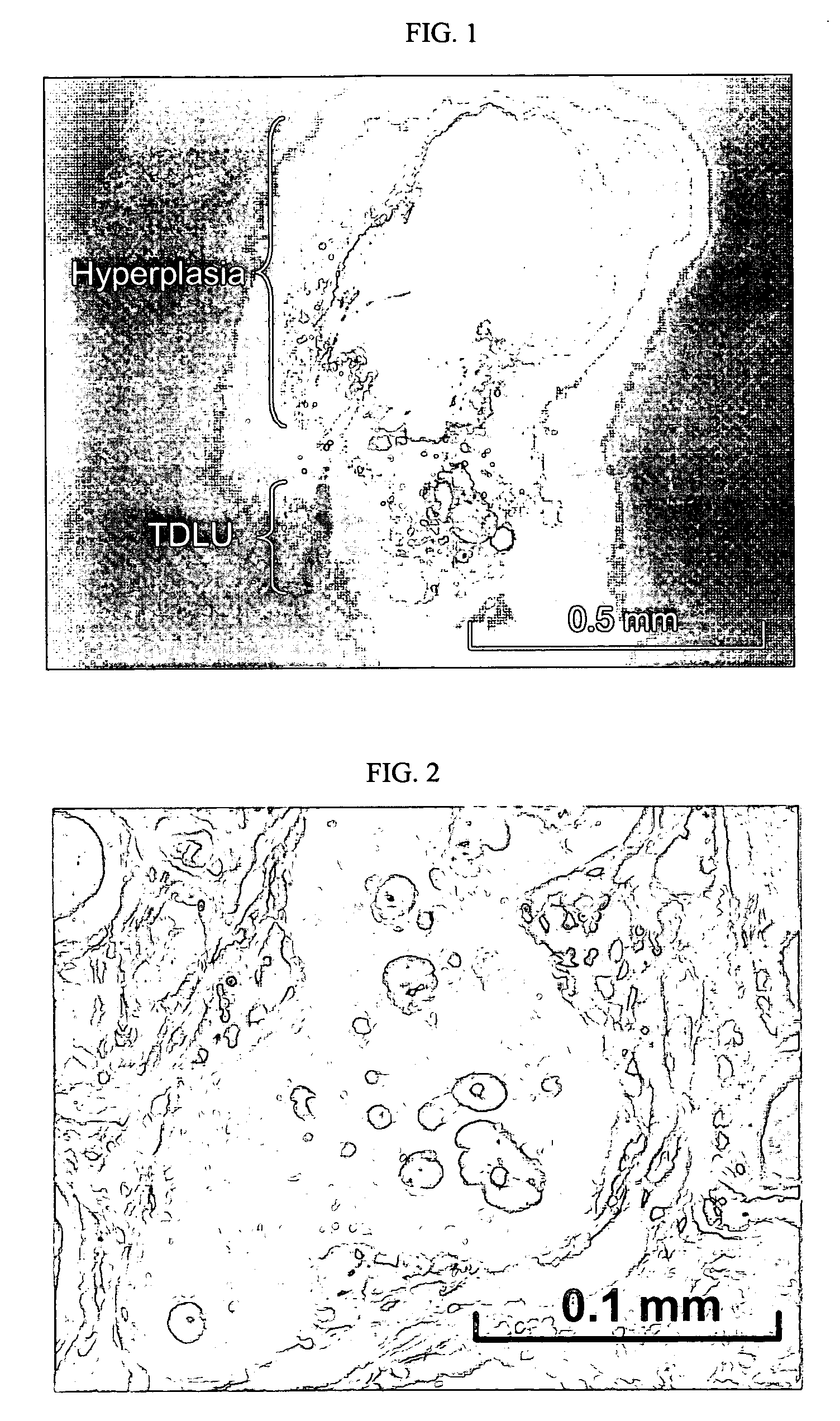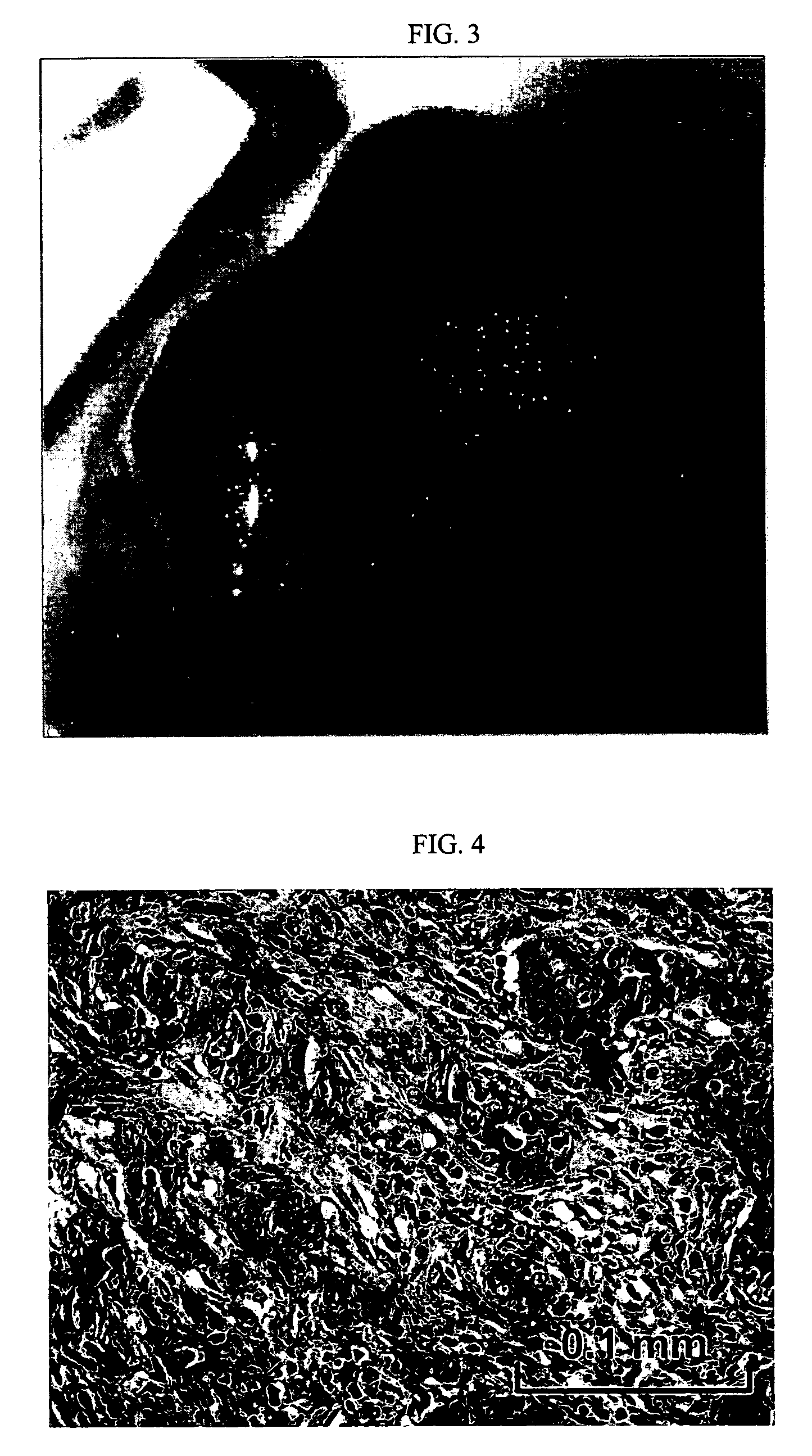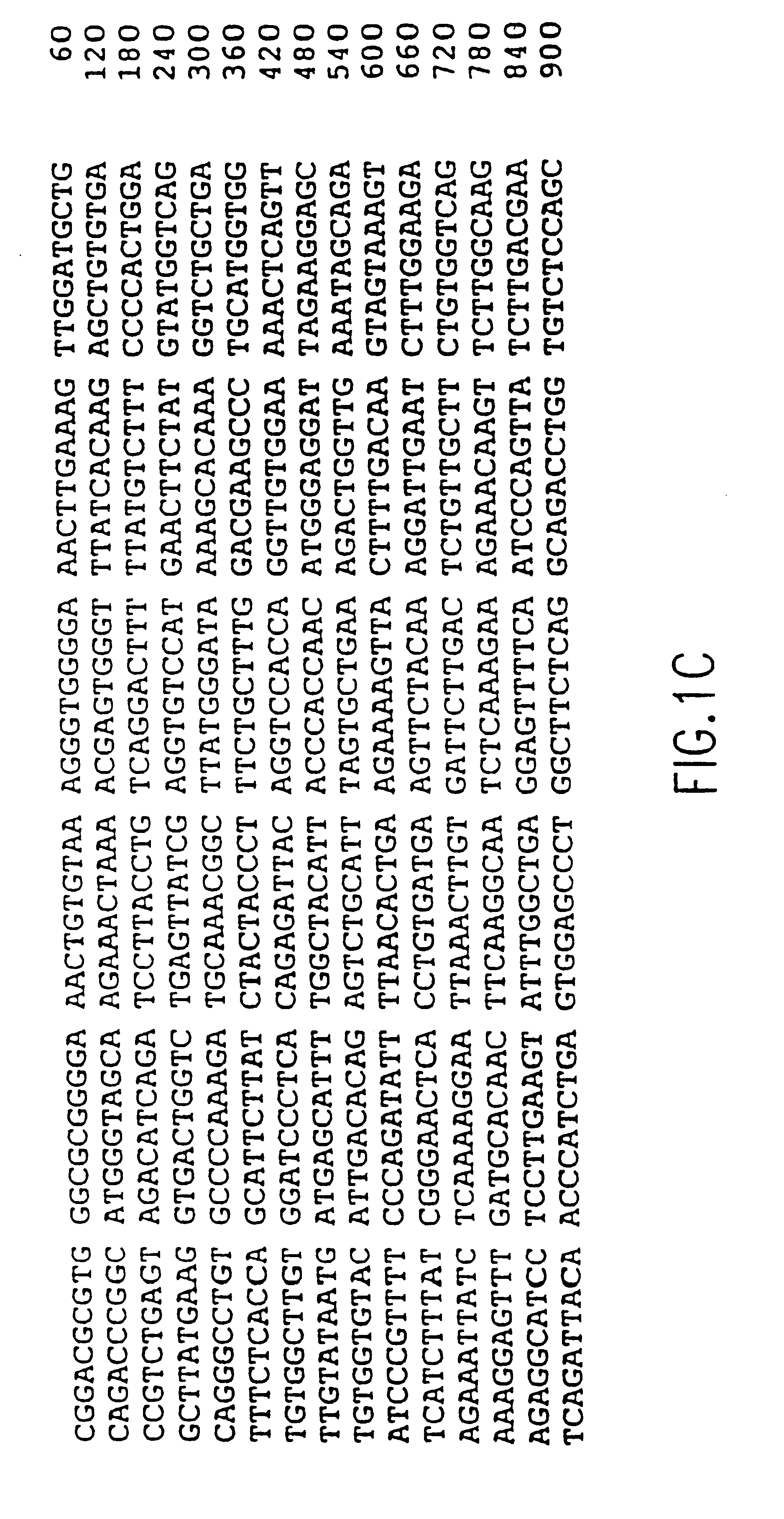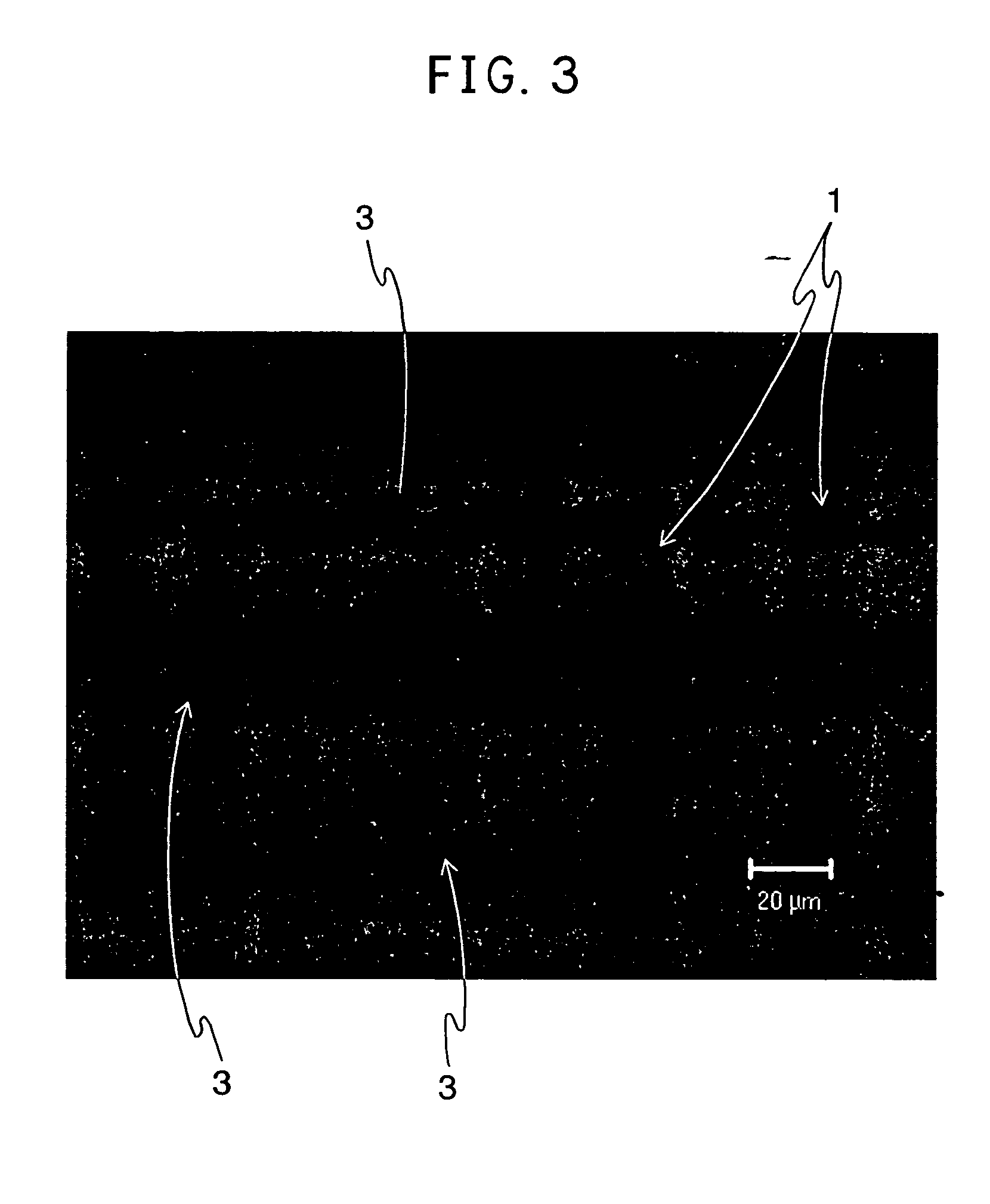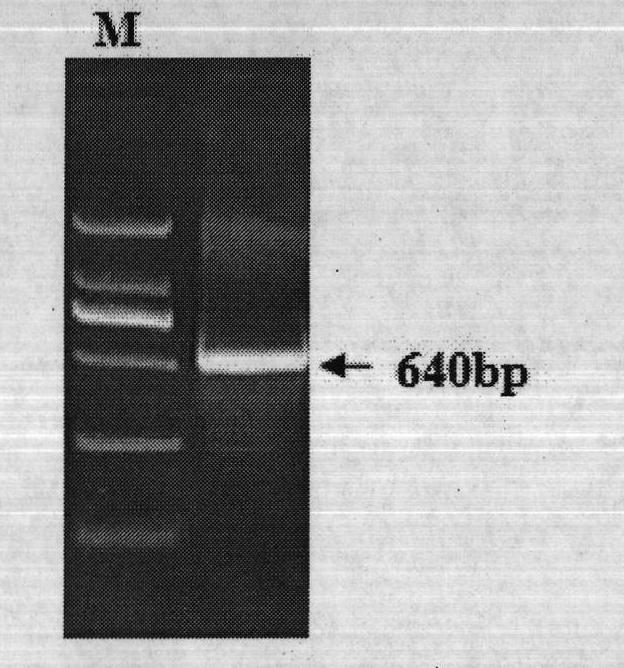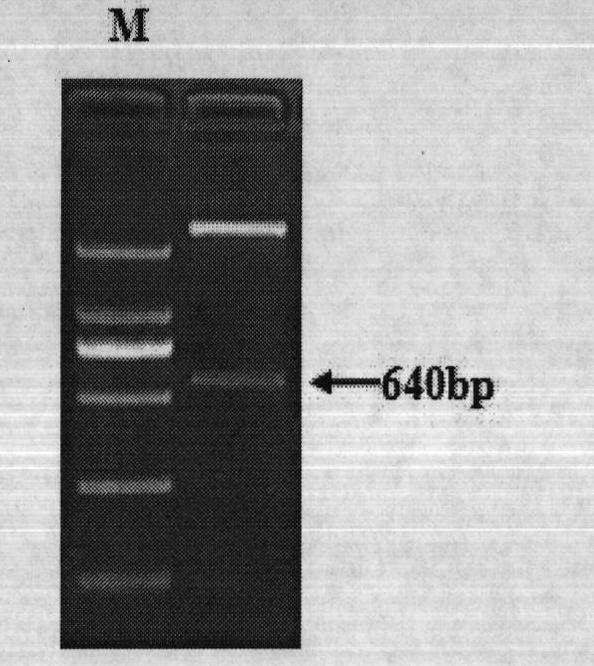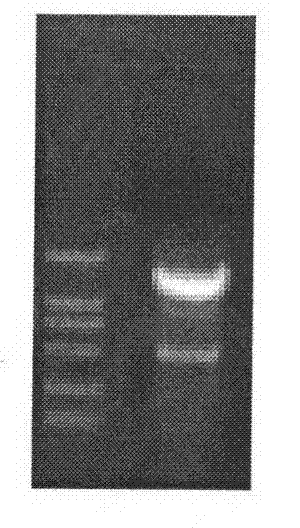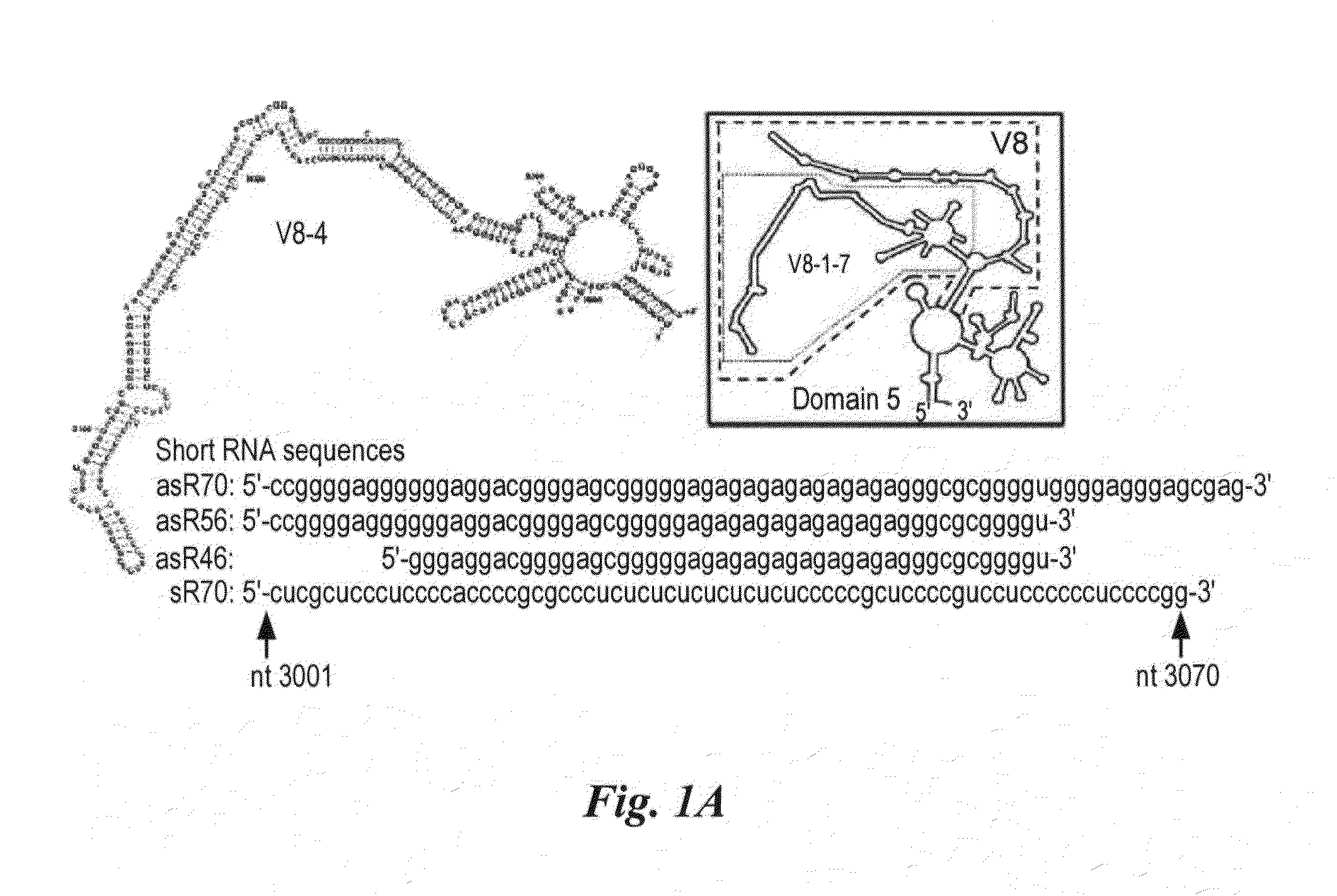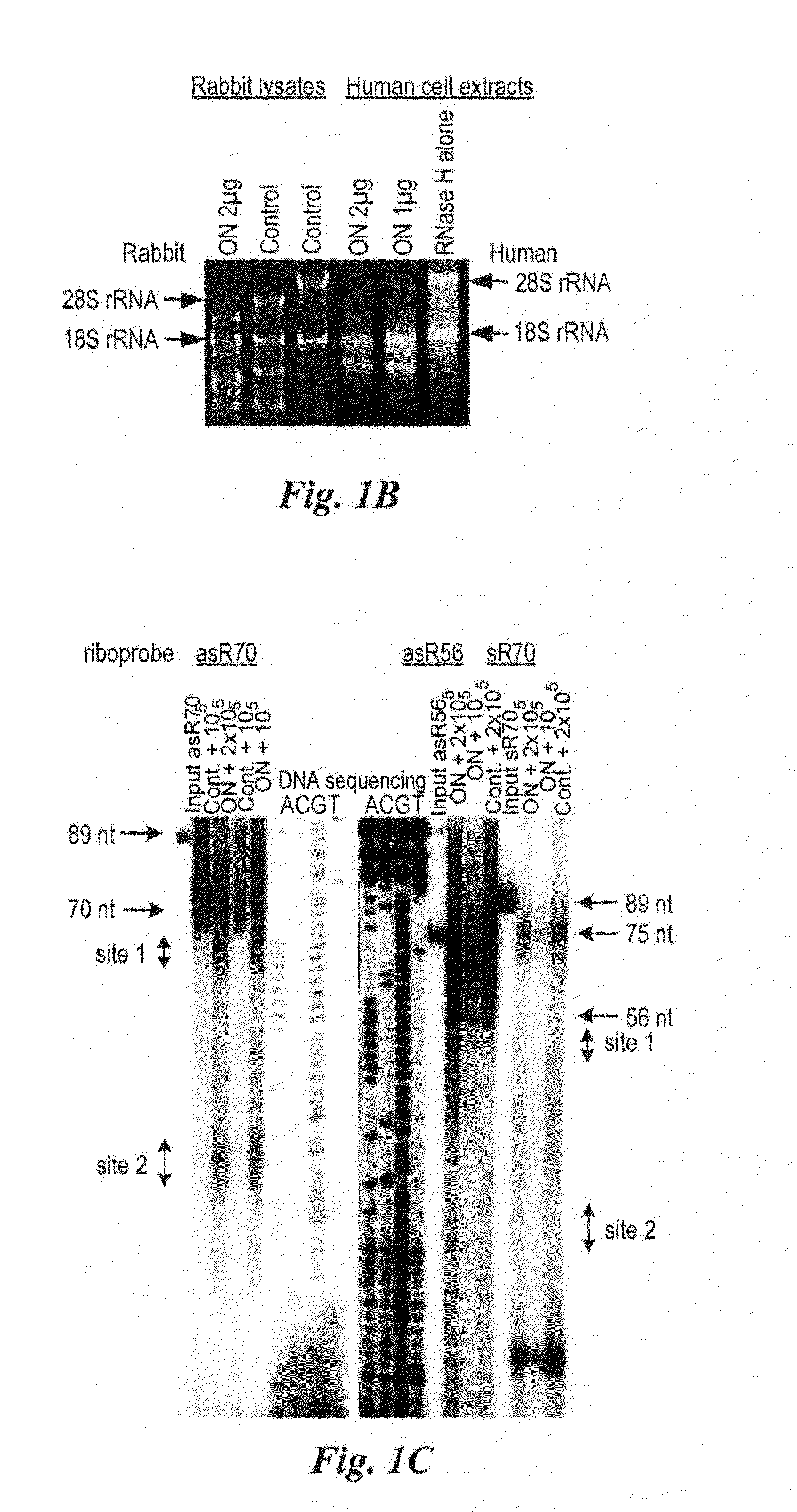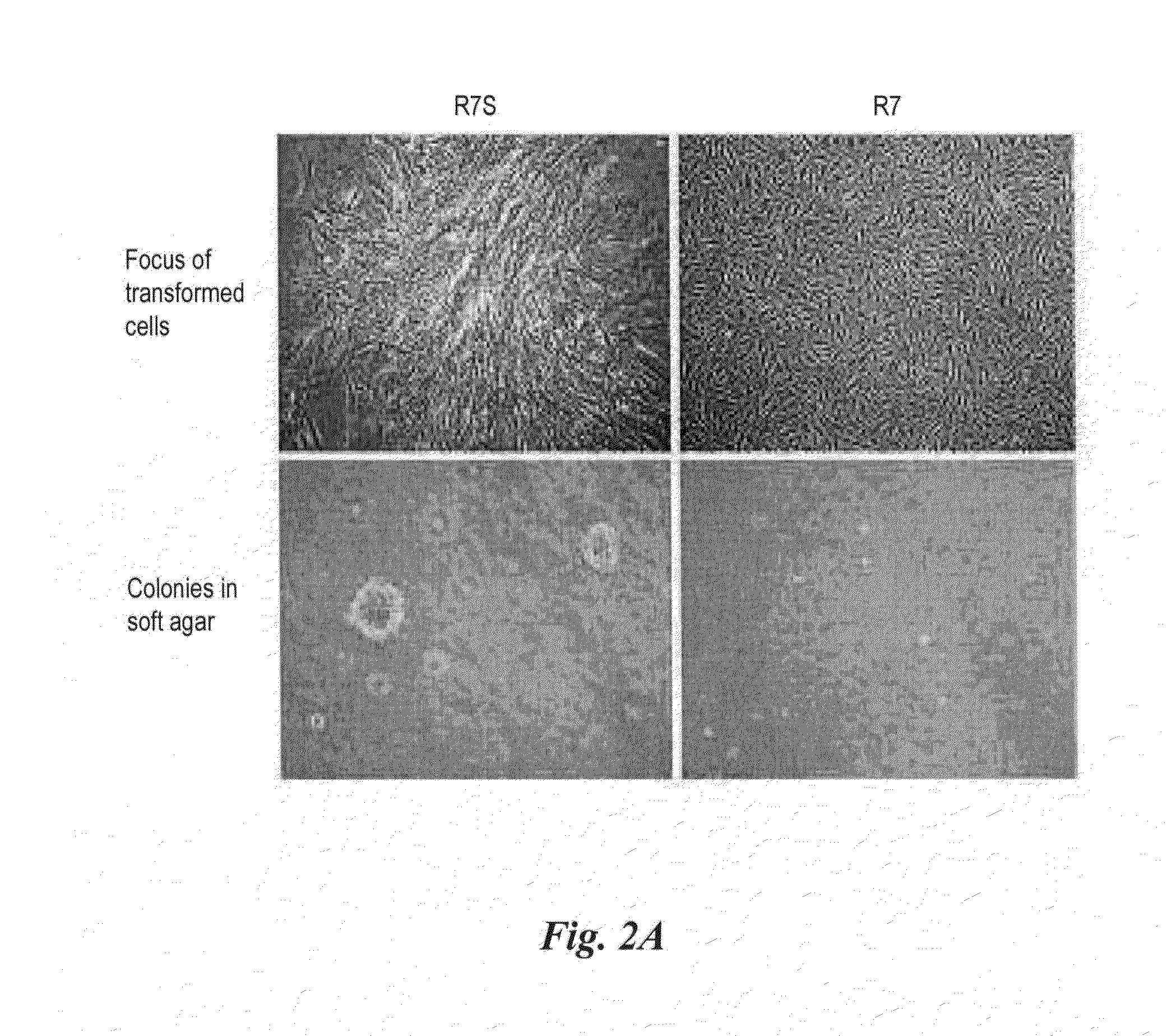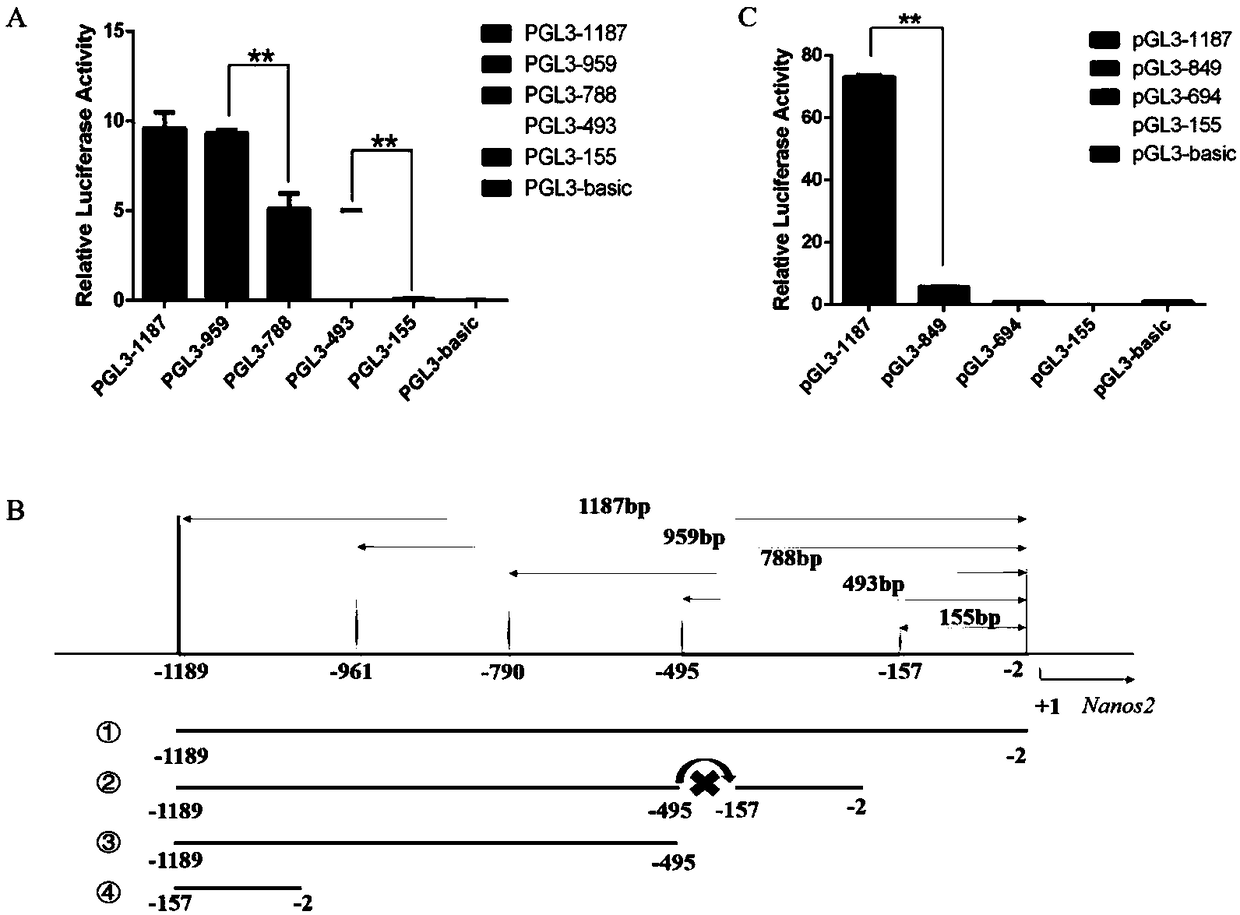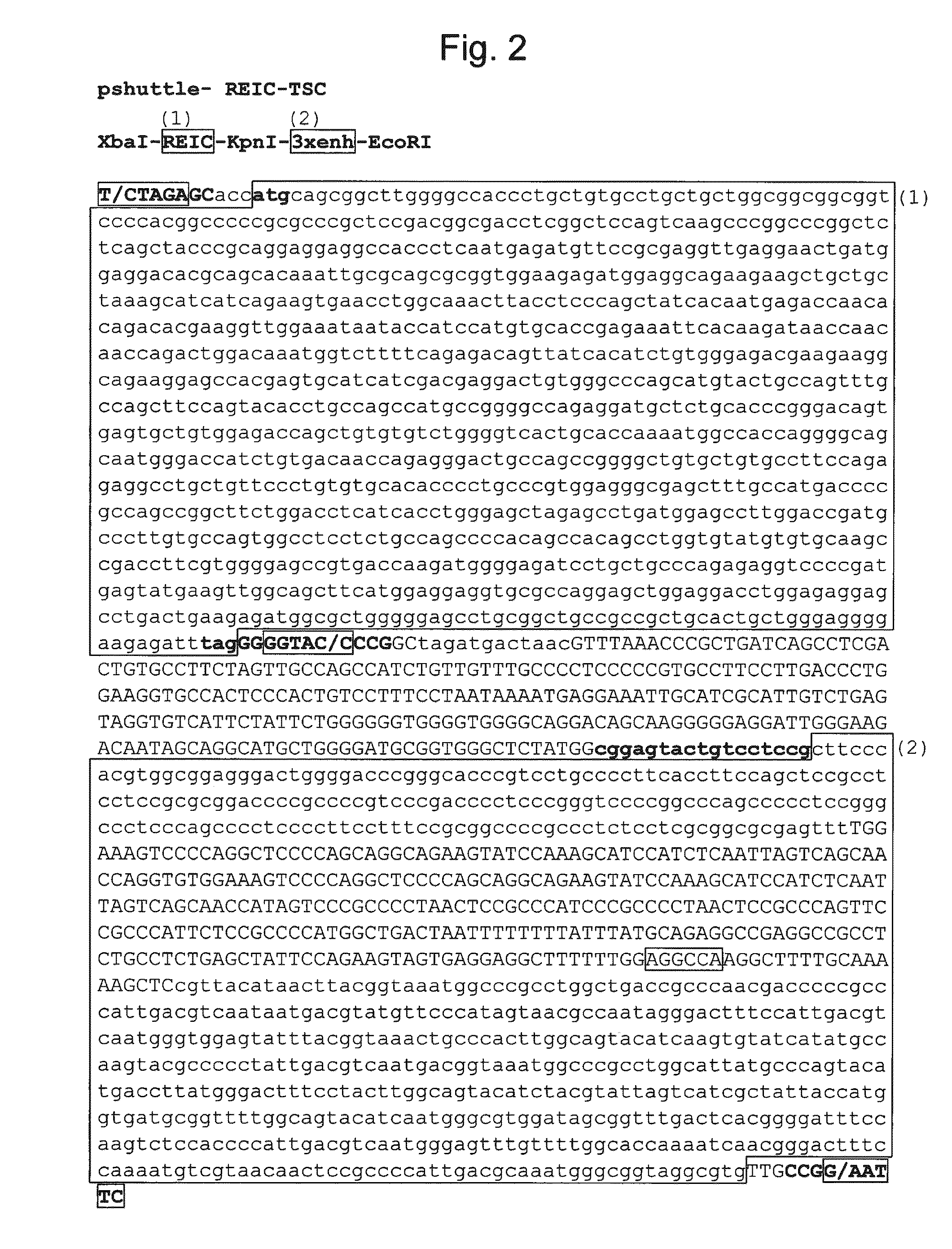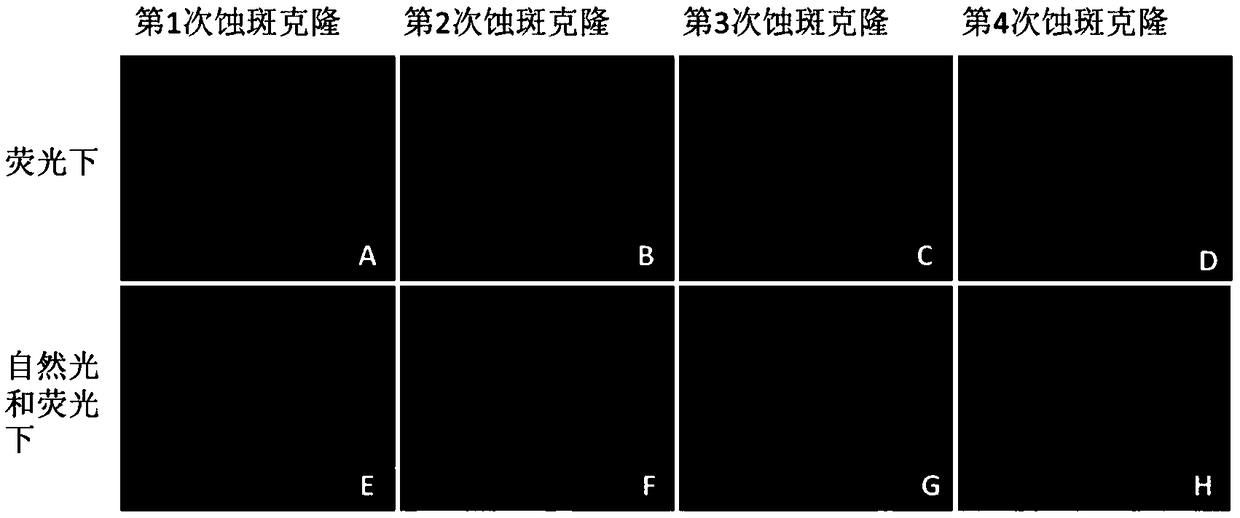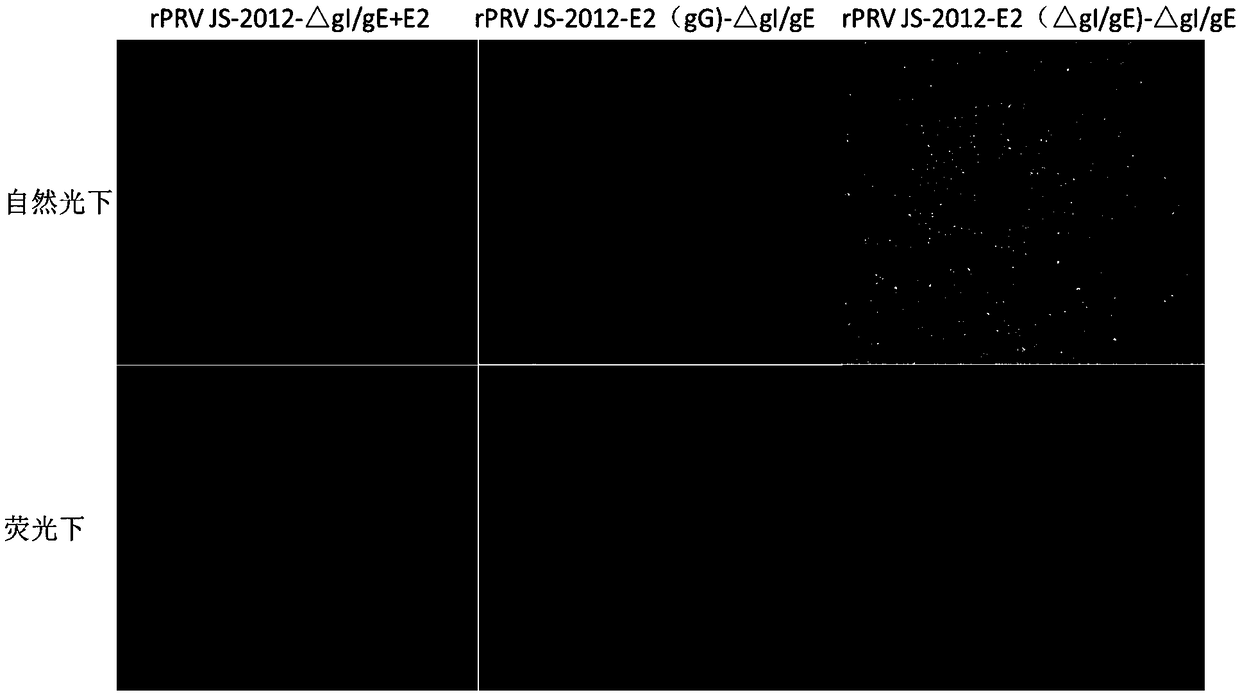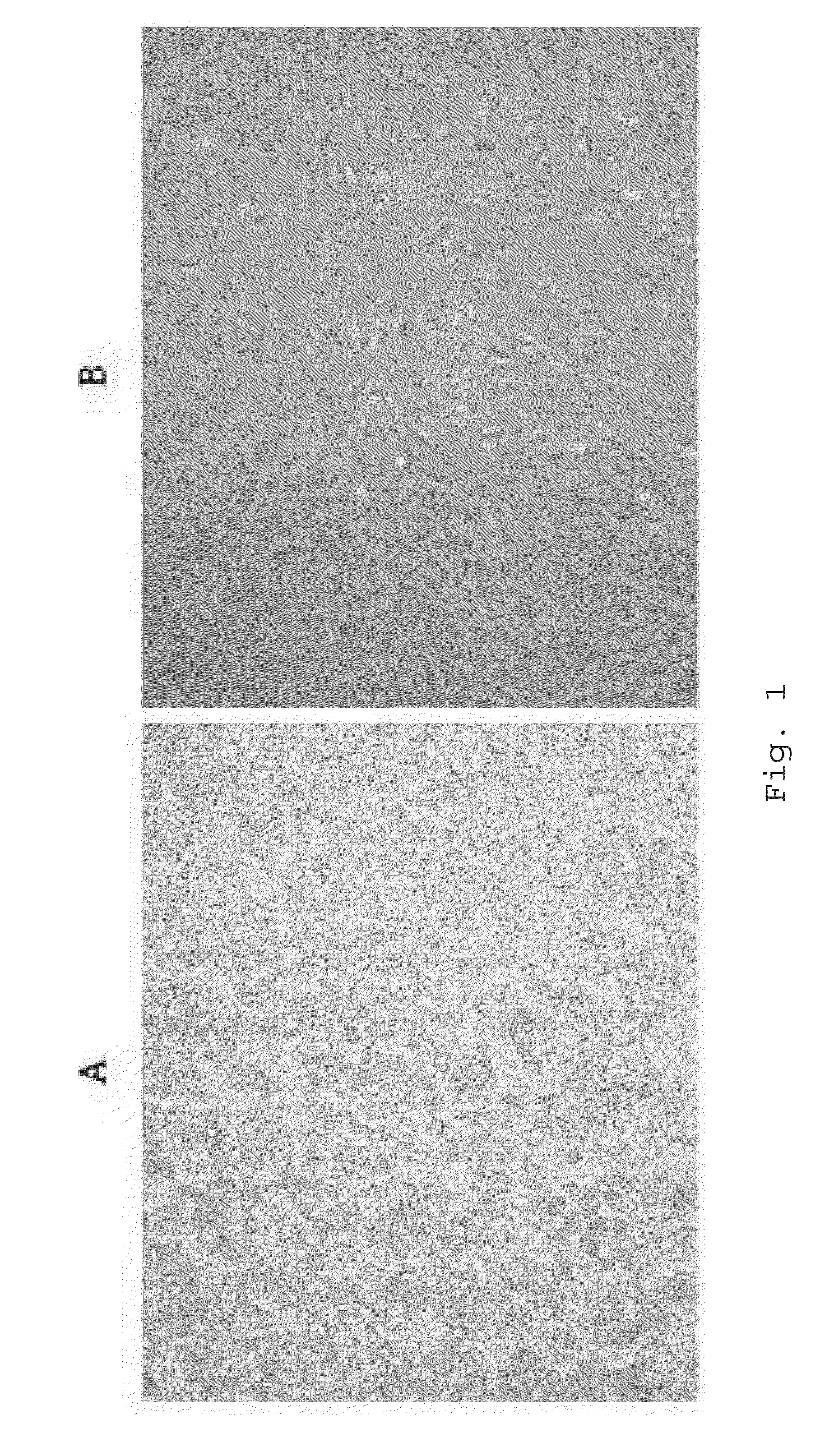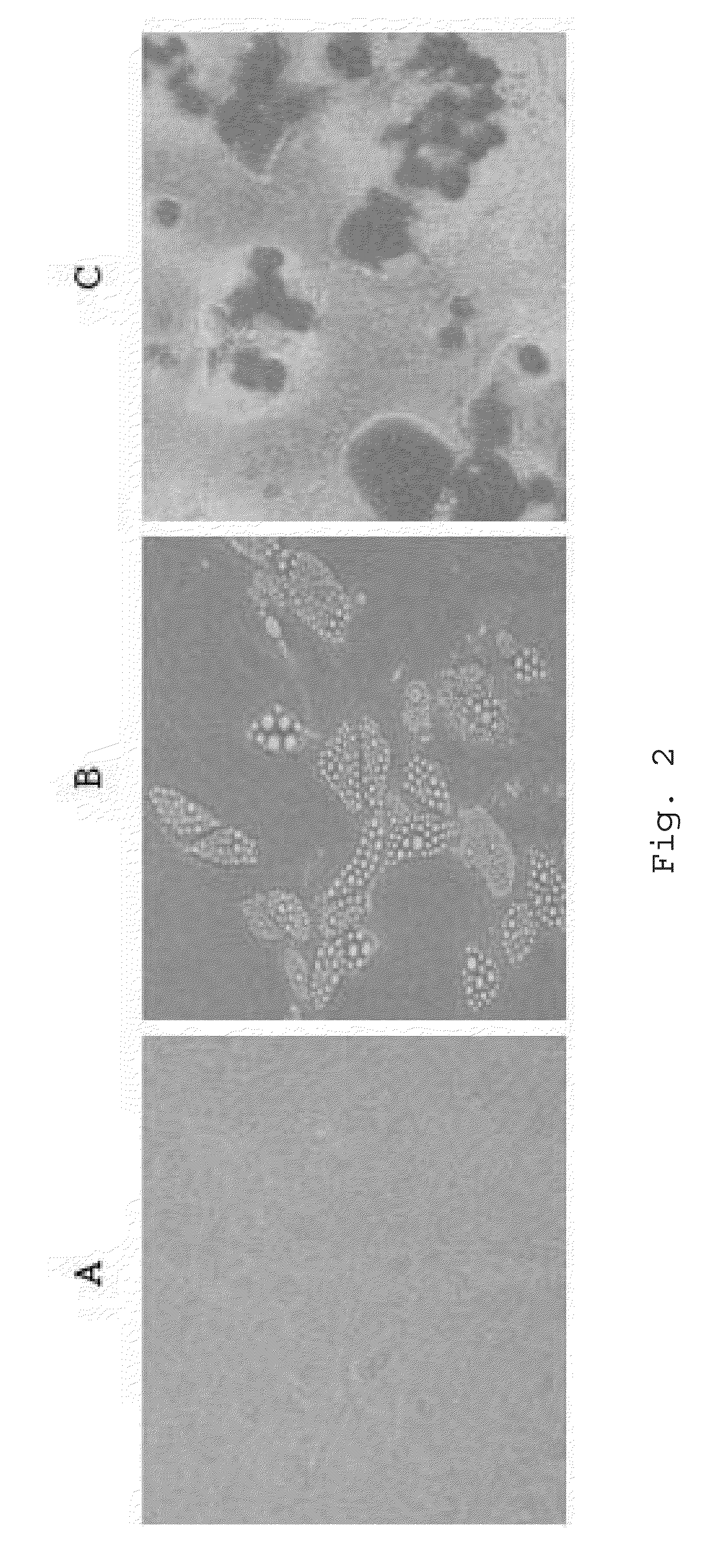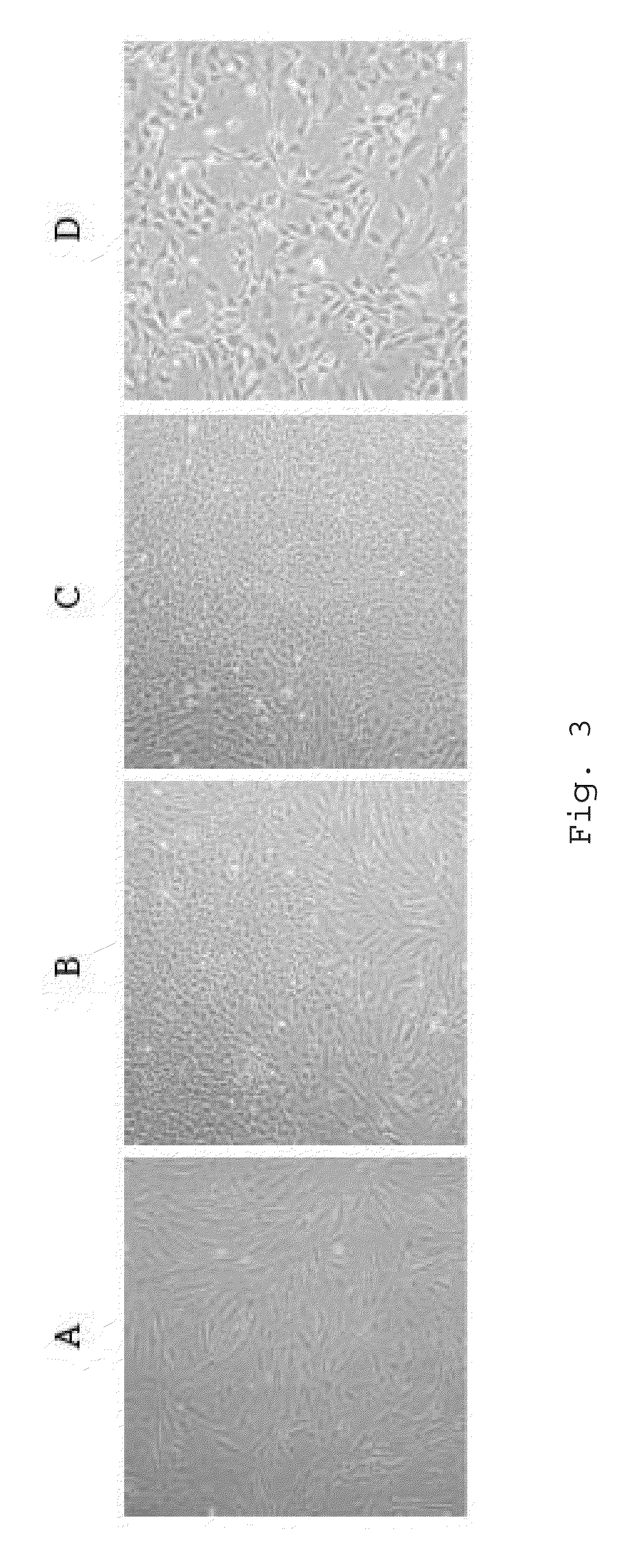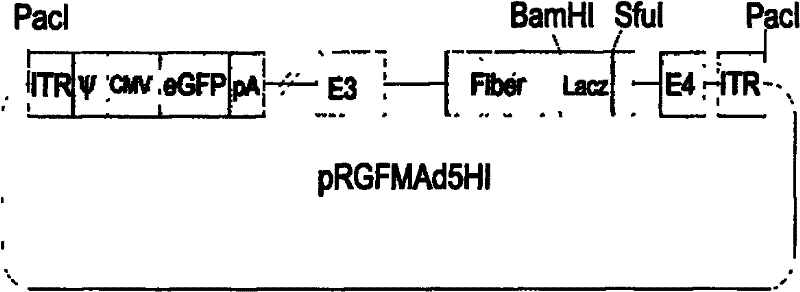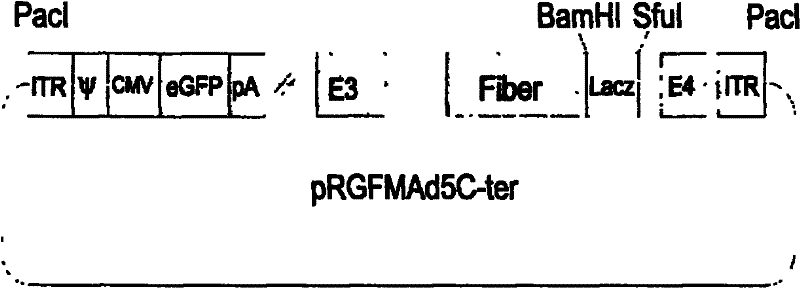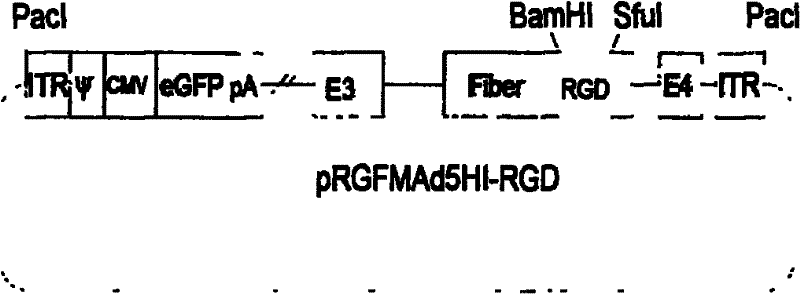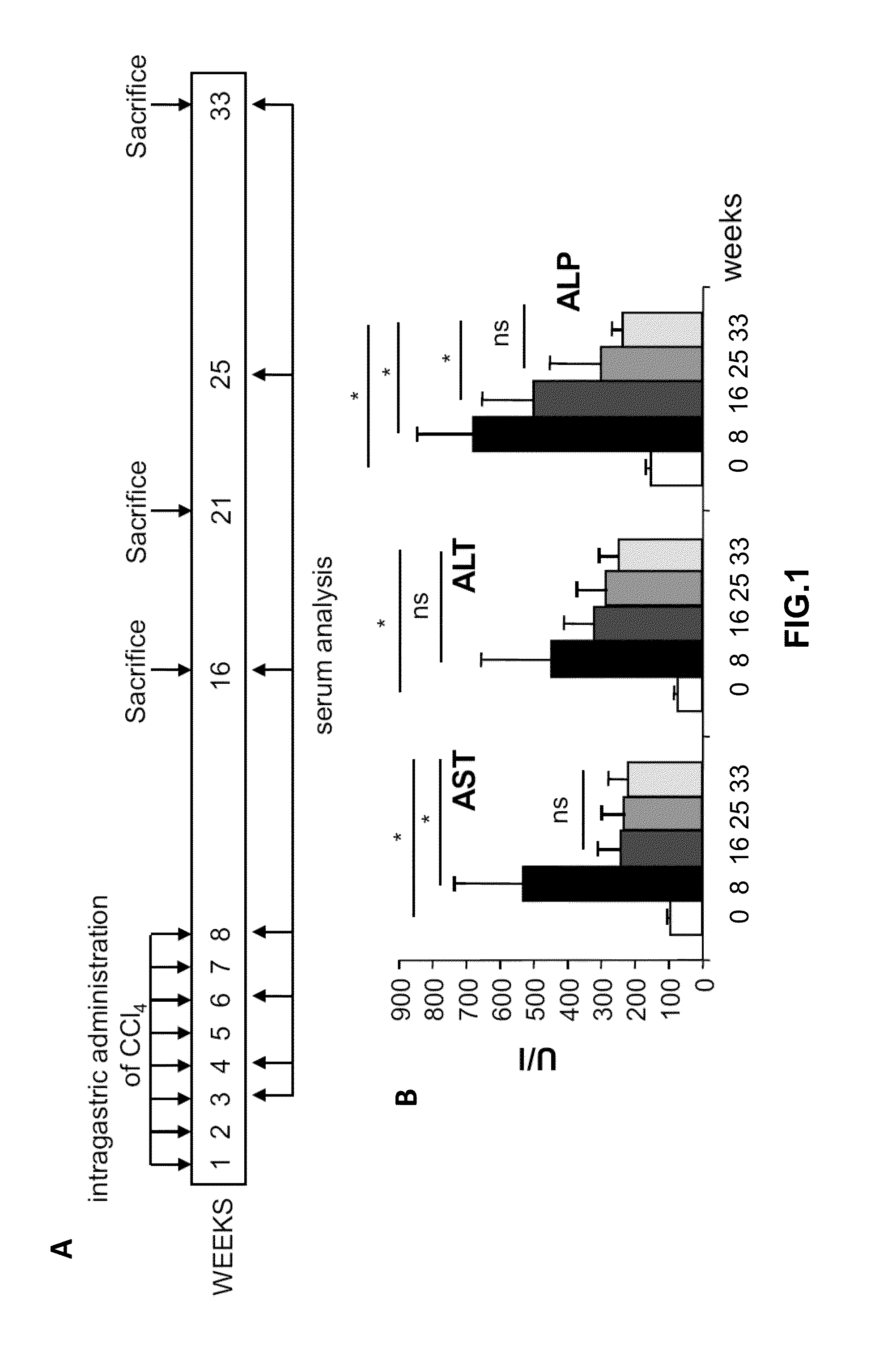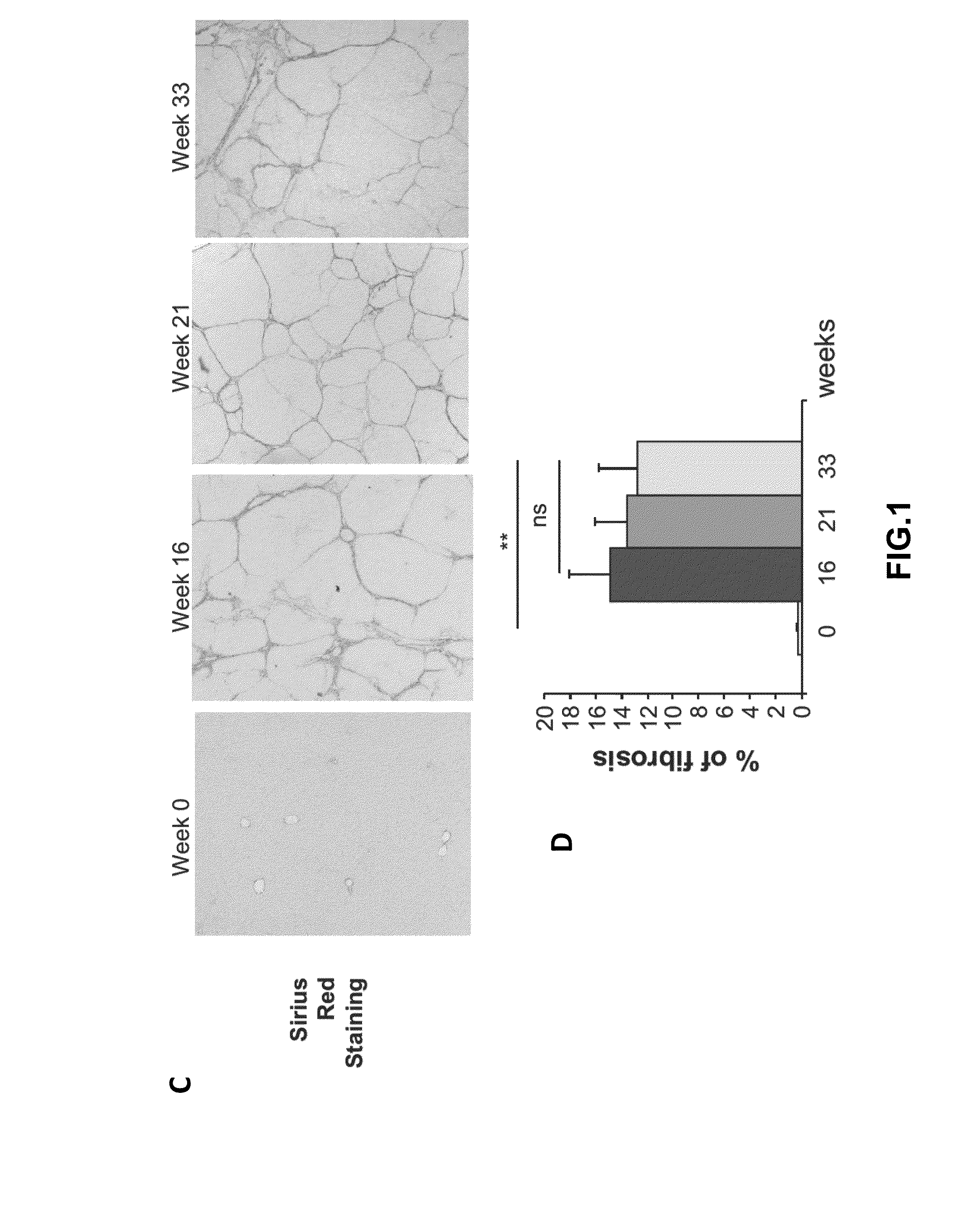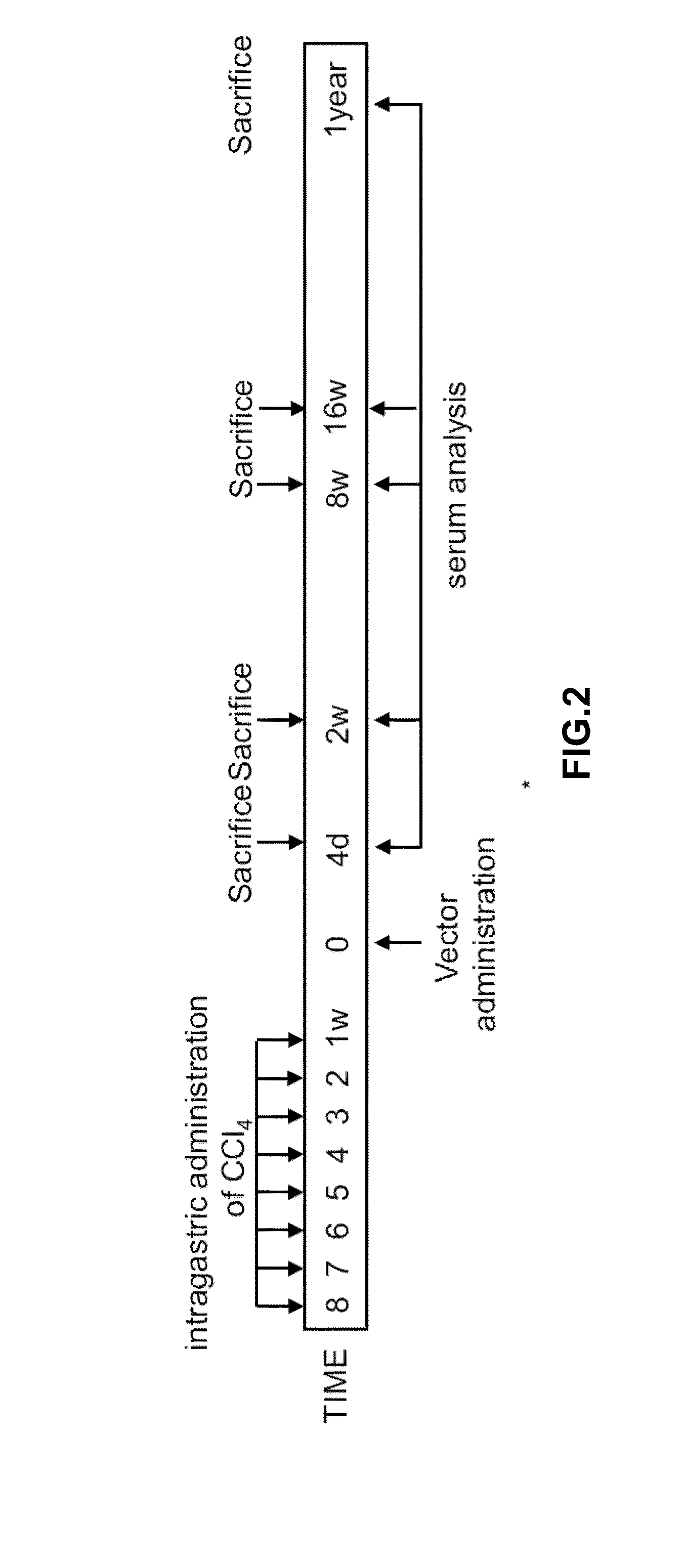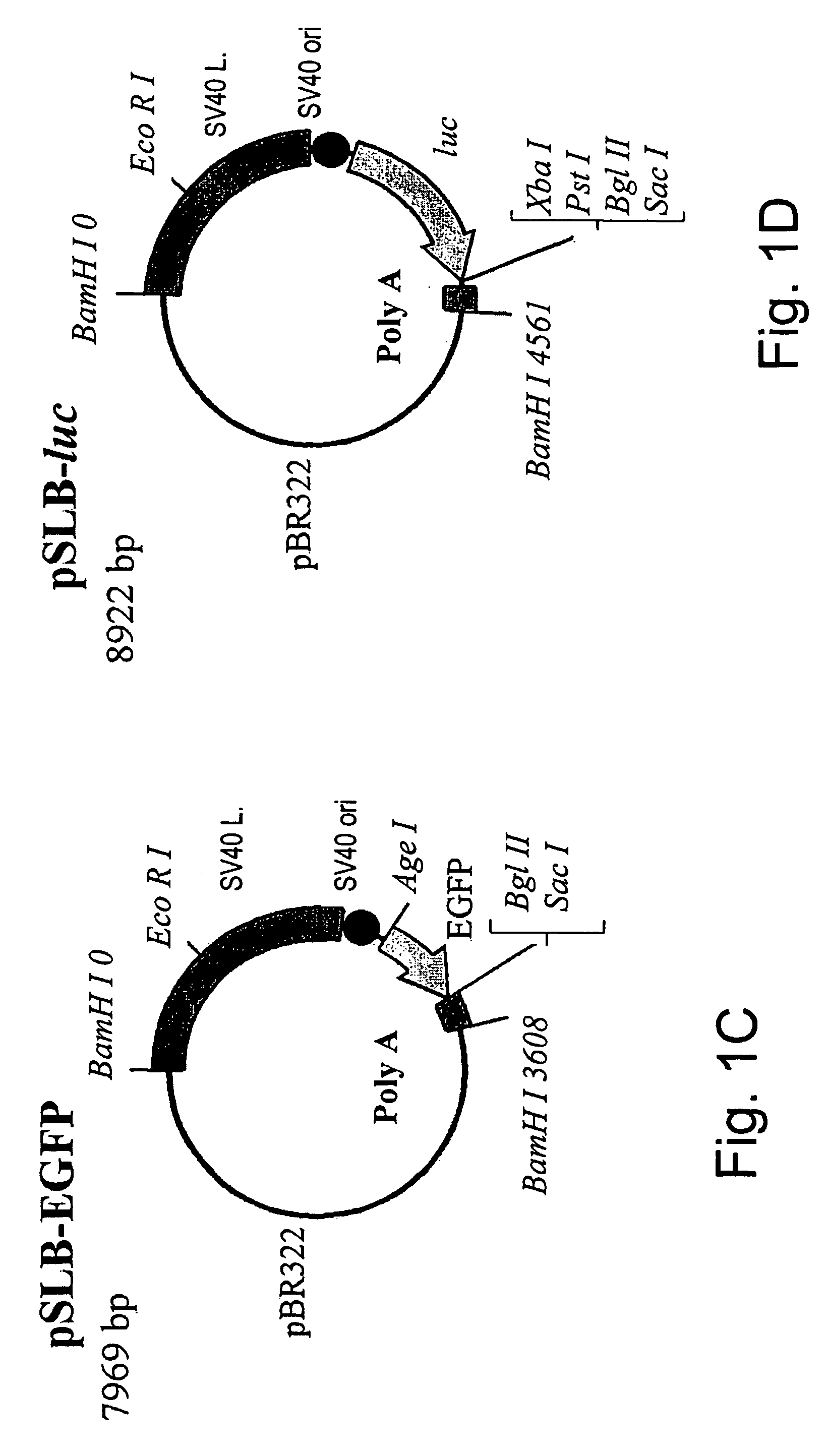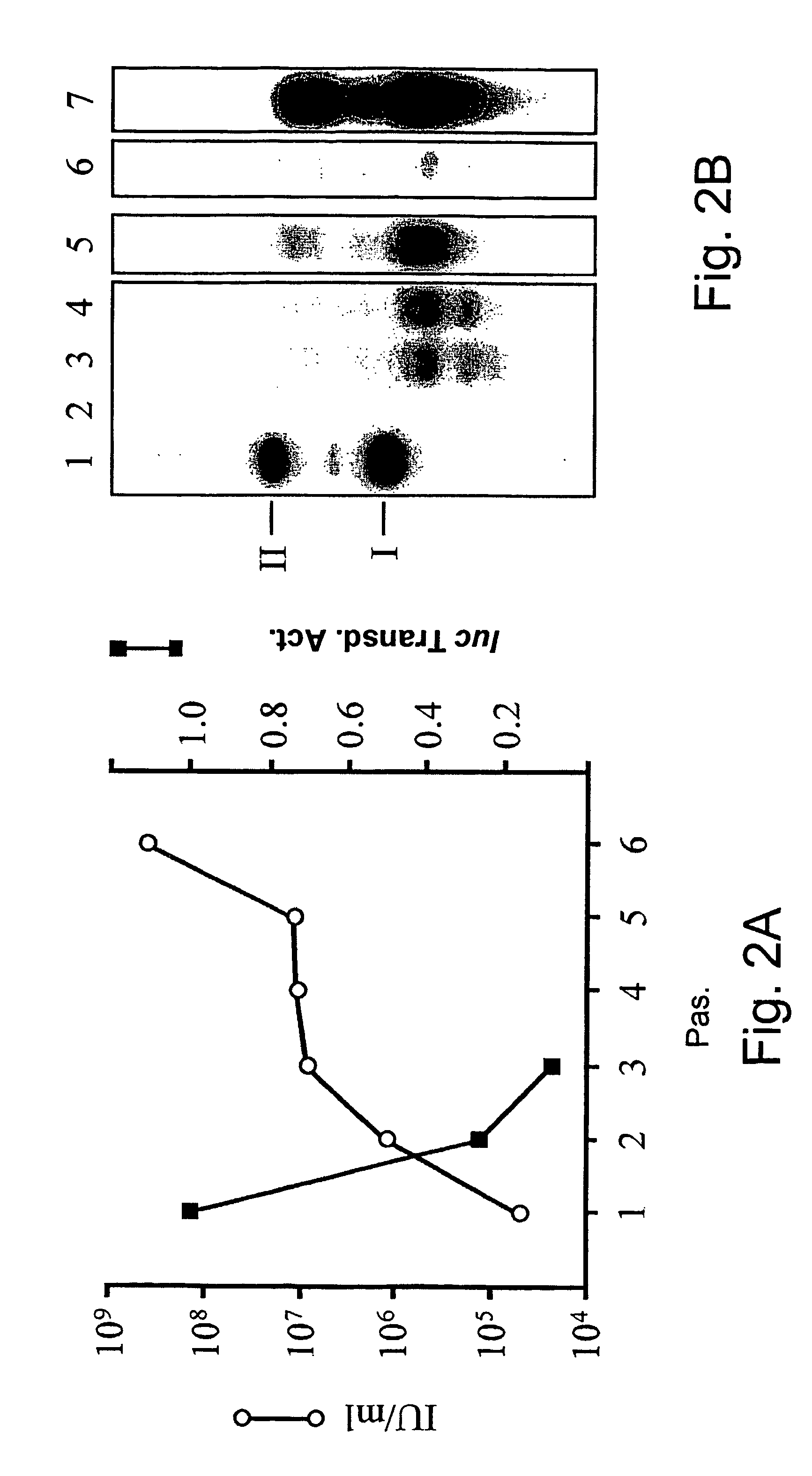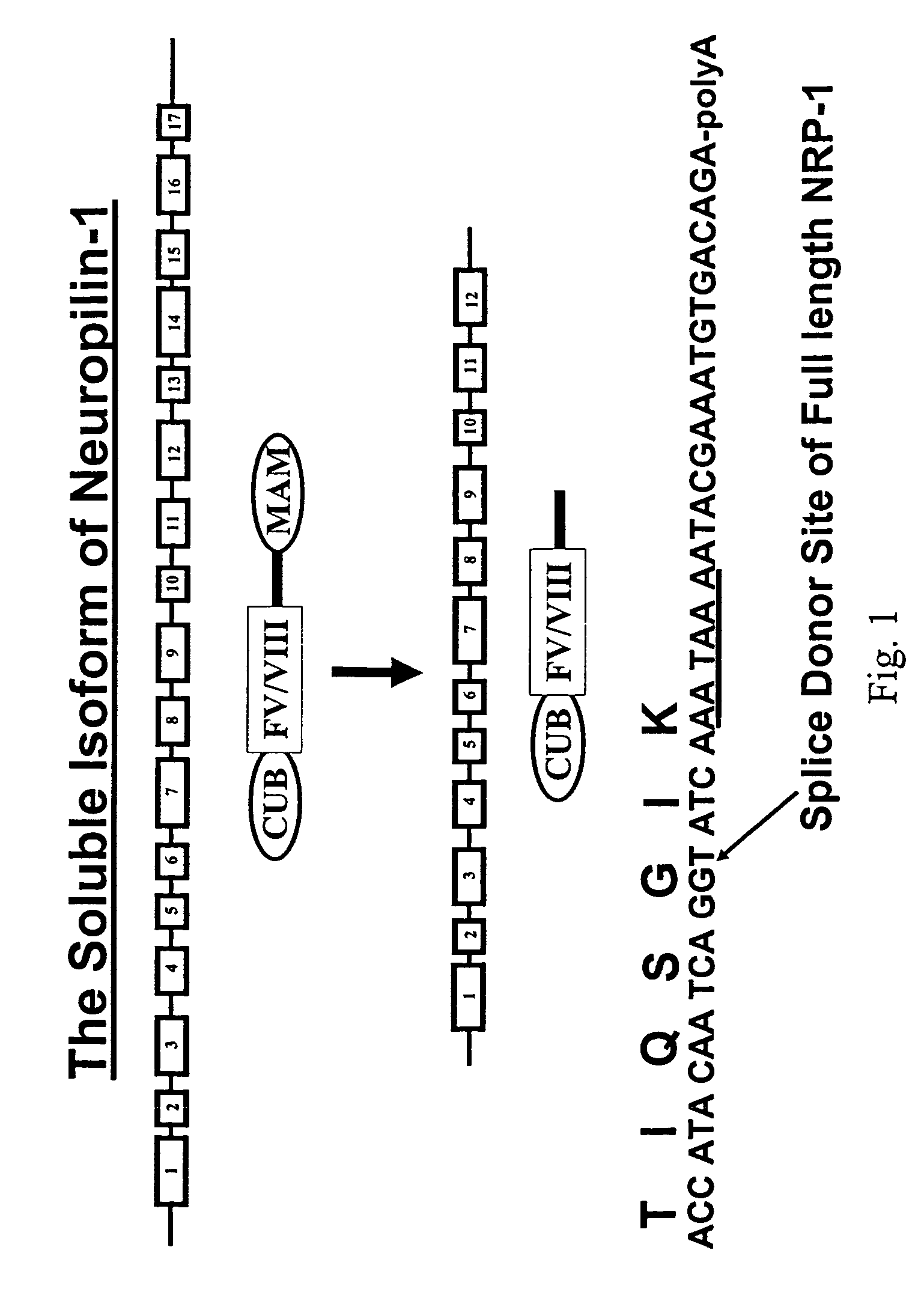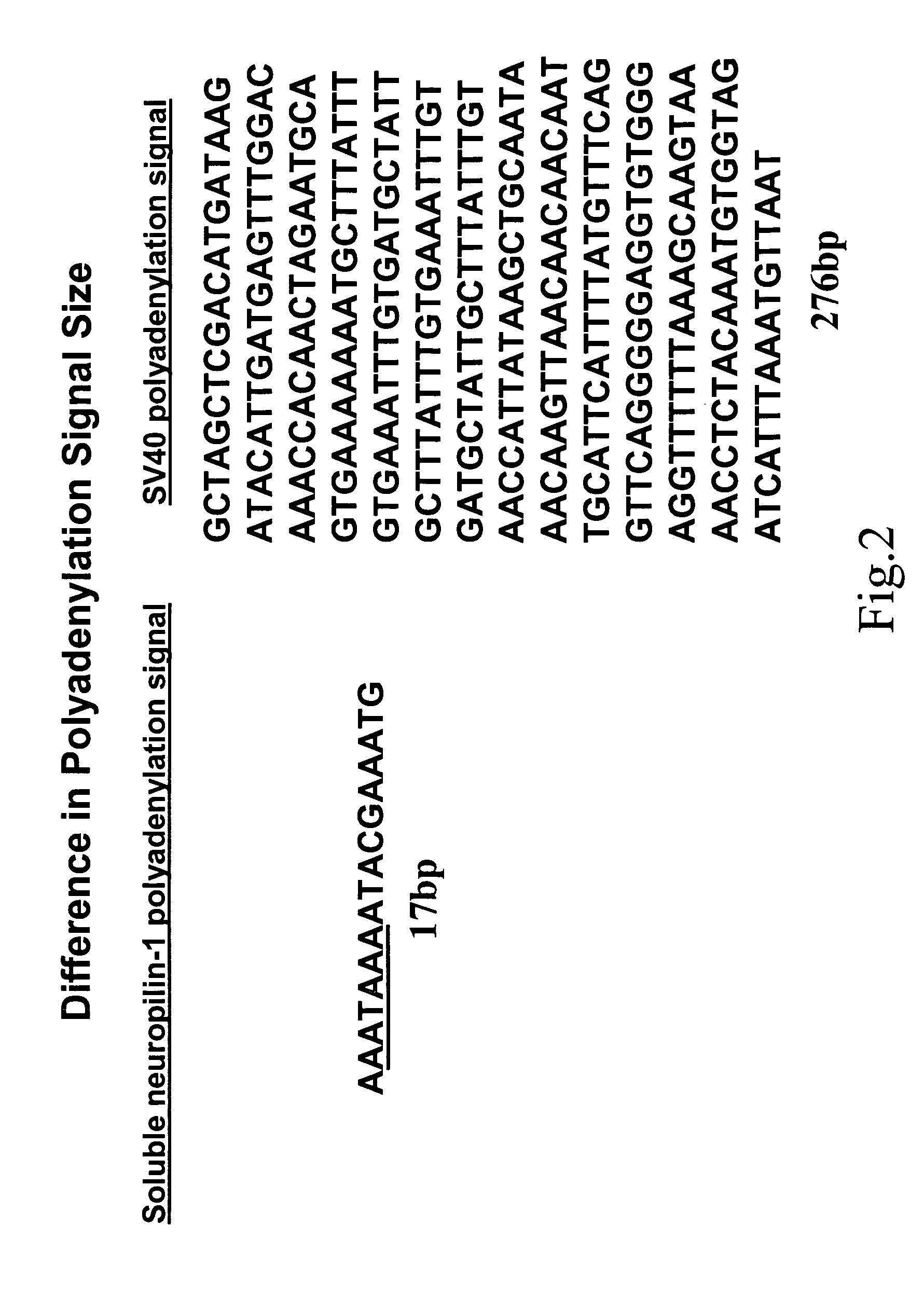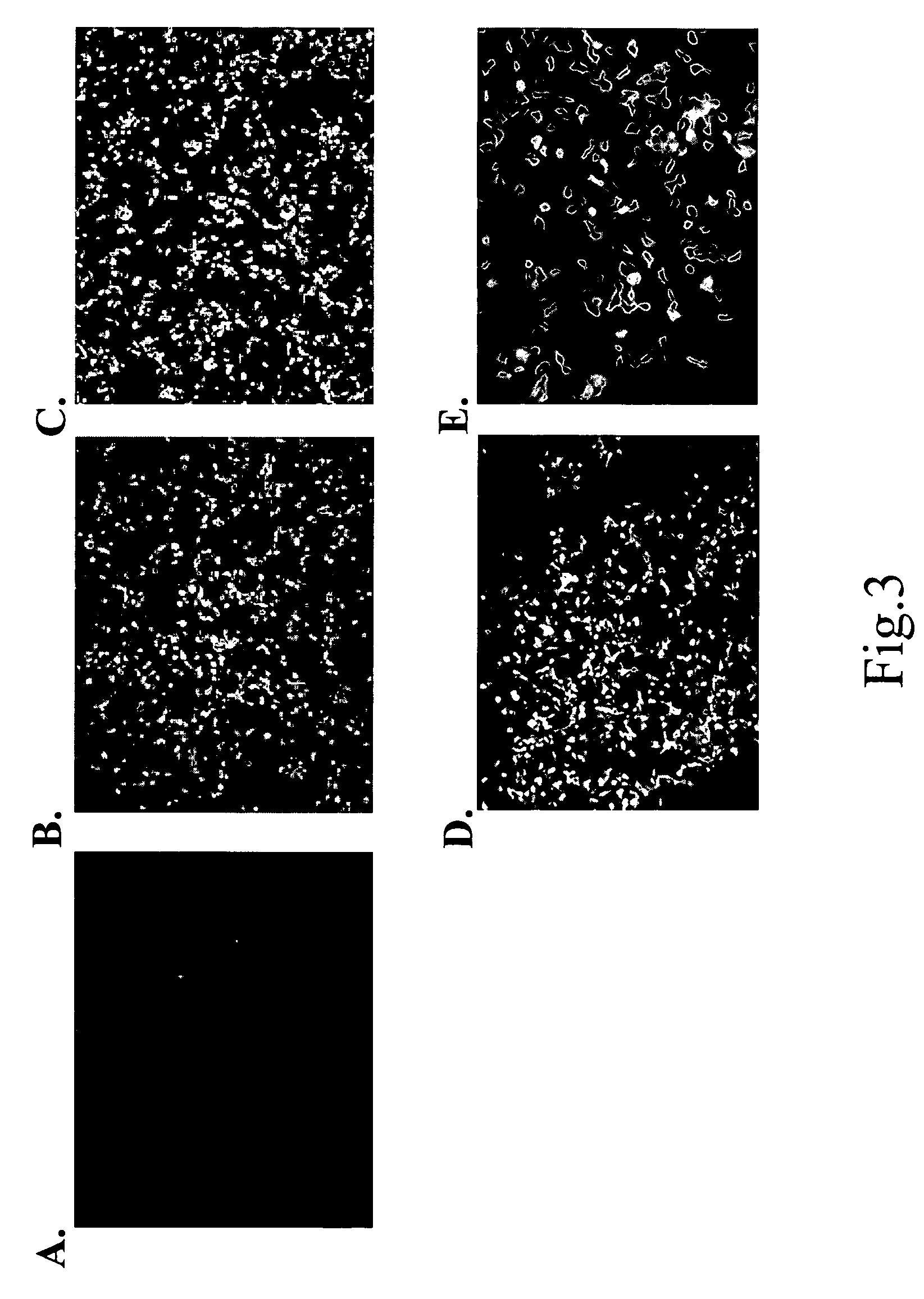Patents
Literature
Hiro is an intelligent assistant for R&D personnel, combined with Patent DNA, to facilitate innovative research.
81 results about "Simian Vacuolating Virus 40" patented technology
Efficacy Topic
Property
Owner
Technical Advancement
Application Domain
Technology Topic
Technology Field Word
Patent Country/Region
Patent Type
Patent Status
Application Year
Inventor
SV40 is an abbreviation for simian vacuolating virus 40 or simian virus 40, a polyomavirus that is found in both monkeys and humans. Like other polyomaviruses, SV40 is a DNA virus that has the potential to cause tumors in animals, but most often persists as a latent infection. SV40 has been widely studied as a model eukaryotic virus, leading to many early discoveries in eukaryotic DNA replication and transcription.
CAR-T transgene vector based on replication defective recombinant lentivirus and construction method and application of CAR-T transgene vector
ActiveCN105602992ASignificant effectPromote secretionGenetic material ingredientsFermentationEucaryotic cellAmpicillin
The invention discloses a CAR-T transgene vector based on replication defective recombinant lentivirus. The CAR-T transgene vector comprises an original nuclear replicon pUCOri sequence, a resistance gene AmpR sequence containing ampicillin, a virus replicon SV40 Ori sequence, a lentivirus packaging cis element, ZsGreen1 green fluorescent protein, an IRES ribosome binding sequence, a human EF1 alpha promoter , a chimeric antigen receptor of second-generation CAR or third-generation CAR and a regulating element, wherein the original nuclear replicon pUCOri sequence is used for plasmid replication; the resistance gene AmpR sequence is used for massively proliferating target strains; the virus replicon SV40 Ori sequence is used for enhancing replication in eukaryocyte; the lentivirus packaging cis element is used for lentivirus packaging; the ZsGreen1 green fluorescent protein is used for expressing green fluorescent for eukaryocyte; the IRES ribosome binding sequence is used for jointly transcribing and expressing protein; the human EF1 alpha promoter is used for conducting eukaryotic transcription on antigen receptor genes; the chimeric antigen receptor is used for forming the second-generation CAR or the third-generation CAR integrating recognition, transfer and start; the regulating element is used for enhancing expression efficiency of transgenes and used after eWPRE-enhanced type woodchuck hepatitis b virus is transcribed. Besides, the invention further discloses a construction method and application of the vector. By means of the CAR-T transgene vector and the construction method and application of the vector, secretion of cell factors and an in vitro killing effect of CAR-T cells can be remarkably improved, and the clinical treatment effect is remarkable.
Owner:SHANGHAI UNICAR THERAPY BIOPHARM TECH CO LTD
Preparation method of immortalization pig liver cell
InactiveCN1869205AProliferate fastNot tumorigenicForeign genetic material cellsBiotechnologyPork Liver
This invention relates to pork liver cell immortalities and its producing method. Procedures are showed: high live ratio fresh original pork liver cell is got by dispase-collagenase perfusion method; it is cultured for 24 hours. Then cell upper heat removing of recombination retronituse that contains SV40 big T antigen is used to infect the pork cell under condition of polybrene which concentration is 8ug / ml. Then it is medicine pressure filtrated by 500ug / ml G418 after one week, single clone cell is picked for large culture when the cell clone appears and grows to 1.0-2.0cm to get pork cell that can passage. Reinfection is done under condition of 8ug / ml polybrene. Then it is medicine pressure filtrated by 2ug / ml puromycin after one week. Single clone cell is picked for large culture when the cell clone appears and grows to 1.0-2.0cm to get immortality pork cell.
Owner:ZHEJIANG UNIV
DNA vaccine carrier of carring SV40 enhancer element
ActiveCN1560259AImproving immunogenicityGenetic material ingredientsAntibody medical ingredientsSv40 virusSimian Vacuolating Virus 40
The invention discloses a novel DNA vaccine particle carrier of enhancing immunogenicity of DNA vaccines, and its characteristic: it contains a segment of SV40 virus enhancer component with a length of 7bp; and the invention also discloses its application in gene immunity and also relates to a method of enhancing the immunogenicity of DNA vaccines.
Owner:NAT CENT FOR AIDSSTD CONTROL & PREVENTION CHINESE CENT FOR DISEASE CONTROL & PREVENTION
Human soluble neuropilin-1 primary polyadenylation signal and uses thereof
InactiveUS20050175591A1Easy to transportImprove translationBiocideGenetic material ingredientsPoly-A RNANucleotide
The human soluble neuropilin-1 (sNRP) polyadenylation signal (sNRP-poly(A)), situated downstream of the GT splice donor site of intron 12 of the full-length neuropilin-1 gene, also functions as the termination codon for sNRP. This 17 nucleotide sequence efficiently facilitates addition of poly(A) tails to RNAs expressed in cells. The present invention shows that this optimally succinct sequence has similar activity to the SV40 polyadenylation signal that is currently used in expression vectors. By using this shorter dual termination / polyadenylation signal and avoiding the need for large and cumbersome polyadenylation signals, expression vectors may be engineered to carry considerably larger genes.
Owner:OREGON HEALTH & SCI UNIV
Viral Particle-Like Construct and Method of Forming the Same Under Physiological Conditions
There is provided a novel method of forming uniform viral particles under physiological conditions. The method of forming uniform-sized viral particle aggregates composed of viral protein is characterized by incubating a viral protein such as SV40 virus VP1 at pH 5.0 to 7.0, room temperature, in the presence of 130 mM to 170 mM sodium chloride and 1.5 mM to 2.5 mM divalent cation, and in the presence of a particle formation acceleration factor such as SV40 VP2. For encapsulation of a substance to be encapsulated in the viral particles, the substance to be encapsulated is included during the incubation.
Owner:TOKYO INST OF TECH
Reconstituted human breast tumor model
InactiveUS20060123494A1Compounds screening/testingVirusesAbnormal tissue growthSimian Vacuolating Virus 40
A reconstituted human breast tumor model is disclosed. The model, which is incorporated into mice, provides actual tumors that arise spontaneously, thereby mimicking naturally occurring breast cancer. The tumors are genetically human, because they arise from human mammary tissues that develop from human mammary epithelial cells implanted into host mice. Prior to implantation, the mammary epithelial cells are genetically modified to contain a recombinant human oncogene and an SV40 early region.
Owner:AVEO PHARM INC
Vector for mediating high-efficiency expression of exogenous gene in cells of mammal and use thereof
InactiveCN102250952AImprove output efficiencyImprove output stabilityVector-based foreign material introductionForeign genetic material cellsBeta globinMammal
The invention discloses a combined vector for mediating the high-efficiency expression of an exogenous gene in cells of a mammal, which comprises an exogenous gene high-efficiency expression vector pATEW and an artificial transcription factor pcDNA3.1(+) / Hy / GVP4. The exogenous gene high-efficiency expression vector pATEW combines gene expression regulatory elements including a human beta-globin MAR sequence, a hEF-1a genetic transcription regulatory sequence, an after-transcription regulatory element WPRE and the like and an artificial transcription factor combined site sequence. The artificial transcription factor expression vector (pcDNA3.1(+) / Hy / GVP4 is an artificial transcription factor GVP4 which is formed by connecting two parts: four tandem repeats of 12 peptides (DALDDFDLDMLG) in VP16, which serves as the functional structural region of the artificial transcription factor; and the nuclear localization sequence of SV40. By co-transfecting cells of the mammal with the pATEW carrying the exogenous gene and the pcDNA3.1(+) / Hy / GVP4, the high-efficiency expression of the exogenous gene in the cells of the mammal can be realized.
Owner:INST OF BIOENG ACAD OF MILITARY MEDICAL SCI OF THE CHINESE
General purpose method for preparing integration type cell immortalization vector
InactiveCN101215577AEfficient immortalization transformationWide range of hostsViruses/bacteriophagesFermentationA-DNAViral vector
The invention discloses a process for preparing a general integrated type cell immortalized vector. The process for preparation comprises following steps: firstly, directionally inserting a cell immortalized gene-simian virus 40 large T antigens (SV40T) gene with the broad spectrum transforming effect into a retroviral vector through a DNA recombinant technique to construct a recombinant expression vector, then, enabling the recombinant vector and packing plasmid pVSV-G to cotransfect GP-293 cells, and preparing recombinant pantropic reverse transcription virus particles which carry a SV40T gene, wherein the recombinant pantropic reverse transcription virus which is obtained is the general integrated type cell immortalized vector. The immortalized vector can enter into all species of animal cells and can integrate the carried SV40T gene to gene groups of target cells which is in mitotic phase to obtain inheritable and stable expression, and thereby integrated transformation with high efficiency of the target cells can be guaranteed. The invention can provide an effective means for transgenic immortalized establishment and studies of various animal cells.
Owner:OCEAN UNIV OF CHINA
Transgenic animals with customizable traits
Disclosed are materials and methods for creating customizable traits in animals. In the demonstration of the principle of the subject invention, a keratin-14 specific promoter is used with, red fluorescent protein in the loxp cassette, dominant black (ΔG23) beta defensin 103 in the pigment cassette, and an SV40 (with intron) polyadenylation sequence. When Cre recombinase (or HTNCre) is applied to the animal's skin in a carrier base (e.g., lipid bilayers), fur is permanently genetically modified to turn black in the shape in which it was applied.
Owner:AGGENETICS
Transgenic animals with customizable traits
InactiveUS20130212723A1Tissue cultureVector-based foreign material introductionPolyadenylationBeta defensin
Disclosed are materials and methods for creating customizable traits in animals. In the demonstration of the principle of the subject invention, a keratin-14 specific promoter is used with red fluorescent protein in the loxp cassette, dominant black (ΔG23) beta defensin 103 in the pigment cassette, and an SV40 (with intron) polyadenylation sequence. When Cre recombinase (or HTNCre) is applied to the animal's skin in a carrier base (e.g., lipid bilayers), fur is permanently genetically modified to turn black in the shape in which the HTNCre was applied.
Owner:AGGENETICS
Sheep induced pluripotent stem cell and preparation method thereof
InactiveCN102586171AFacilitate revealing functionHelps reveal complexityArtificial cell constructsVertebrate cellsLentivirusLIN28
The invention relates to a sheep induced pluripotent stem cell and a preparation method thereof. The preparation method comprises the steps of: A) constructing lentivirus vectors with transcription factors, wherein the transcription factors are selected from Oct4, Sox2, c-Myc, K1f4, Lin28, Nanog, SV40 and hTERT; and B) infecting sheep adult cells to the transcription factors in a combining form by adopting the lentivirus vectors obtained in the step A), selecting cloned passages with forms similar to those of embryonic stem cells for culturing, and sieving the cells satisfied with characteristics of embryonic stem cells for cloning so as to obtain the sheep induced pluripotent stem cells. The sheep induced pluripotent stem cell and the preparation method thereof, disclosed by the invention, are good for determining most suitable culture condition and method of sheep ES cell establishment system; the sheep induced pluripotent stem cell is a good carrier for sheep gene targeting; and the sheep induced pluripotent stem cell is beneficial to revealing gene functions and complex development events of sheep and can be used for improving species and promoting economic growth.
Owner:SHANGHAI INST OF BIOLOGICAL SCI CHINESE ACAD OF SCI
Recombinant canine adenovirus type 2 transfer vector, construction method and application thereof
InactiveCN101358202AReduce workloadStable biological propertiesViruses/bacteriophagesFermentationPurification methodsFluorescence
The present invention discloses a recombinant canine adenovirus-2 transfer vector, a method for constructing the recombinant canine adenovirus-2 transfer vector and an applications thereof. The recombinant canine adenovirus-2 transfer vector loses the 1412bp fragment of the E3 region, a large fragment of exogenous gene can be inserted, and moreover, a hCMV IE promoter, a multiple cloning site, an enhanced green fluorescent protein gene and a SV40 early transcribed Poly A signal sequence can be inserted in the position of the lost fragment of the E3 region. The method successfully constructs the lost recombinant CAV-2 transfer vector of the E3 region, obtains a purified canine adenovirus-2 strain containing EGFP reporter gene and optimizes the cloning and purification method thereof, an evaluation indicates that the biological property of the recombinant virus is stable, and therefore the present invention provides a technical platform for the further development of CAV-2 live vector vaccine and related fundamental researches.
Owner:HARBIN VETERINARY RES INST CHINESE ACADEMY OF AGRI SCI
Transgenic animals with customizable traits
Disclosed are materials and methods for creating customizable traits in animals. In the demonstration of the principle of the subject invention, a keratin-14 specific promoter is used with, red fluorescent protein in the loxp cassette, dominant black (ΔG23) beta defensin 103 in the pigment cassette, and an SV40 (with intron) polyadenylation sequence. When Cre recombinase (or HTNCre) is applied to the animal's skin in a carrier base (e.g., lipid bilayers), fur is permanently genetically modified to turn black in the shape in which it was applied.
Owner:AGGENETICS
Expression vector for large green alga bioreactor and transformation method thereof
InactiveCN102102107AVersatilityAffect start-up efficiencyAlgae productsVector-based foreign material introductionResistant genesGreen fluorescent protein
The invention provides a vector capable of making an exogenous gene expressed stably and efficiently in a large green alga bioreactor and a method thereof for transformation and expression in a large green alga. In the invention, a protoplast of a large green alga is used as a receptor, the conventional vector of higher plants or a vector modified by a homologous recombination technique are fully utilized to construct a green fluorescent tracing and fusion protein gene-containing vector PSB-bar-ZsGeen for use in a large green alga bioreactor, and the vector PSB-bar-ZsGee is connected with a SV40 gene promoter, a resistance gene, a cytomegalovirus (CMV) promoter and the like in turn to realize the high-efficiency and stable expression of the exogenous gene in the large green alga.
Owner:SHANGHAI OCEAN UNIV
Methods and compositions for the treatment of cirrhosis and liver fibrosis
The invention provides a method for the treatment of cirrhosis and liver fibrosis by the use or viral vectors containing the gene encoding IGF-I. The invention discloses both parvoviral vectors and SV40-based vectors as well uses thereof for the treatment of cirrhosis and gene therapy and methods for the preparation of said viral vectors.
Owner:PROYECTO DE BIOMEDICINA CIMA
Over-expression vector for muscle specific expression of pig IGF1 gene
InactiveCN102978202AVector-based foreign material introductionDNA/RNA fragmentationAlpha-ActinWild type
The invention provides a secure expression vector for specific over-expression of pig endogenous gene IGF1 (C1 : Ea) in pig skeletal muscle. The vector comprises an expression cassette composed of the pig endogenous sequence sk-alpha-actinPromoter / IGF1 (C1 : Ea) / sk-alpha-actin3'UTR / SV40 enhancer in series. The expression vector verifies on a cell scale that the skeletal muscle specific sk-alpha-actin promoter can be expressed efficiently in myoblasts, and expressed at lower level in PET cells having myogenic differentiation potential, but not expressed in other type cells. By using the constructed vector for preparing transgenic mice, the detected mRNA expression level and protein expression level of the IGF1 gene in the skeletal muscle of the transgenic mice via quantification PCR and WesterBlot are 15 times and 3.5 times that of the wild mice respectively; and the IGF1 gene can be only expressed in the skeletal muscle efficiently.
Owner:INST OF ANIMAL SCI OF CHINESE ACAD OF AGRI SCI +1
Reconstituted human breast tumor model
InactiveUS20060123493A1Compounds screening/testingVirusesAbnormal tissue growthHuman Mammary Epithelium
A reconstituted human breast tumor model is disclosed. The model, which is incorporated into mice, provides actual tumors that arise spontaneously, thereby mimicking naturally occurring breast cancer. The tumors are genetically human, because they arise from human mammary tissues that develop from human mammary epithelial cells implanted into host mice. Prior to implantation, the mammary epithelial cells are genetically modified to contain a recombinant human oncogene and an SV40 early region.
Owner:AVEO PHARM INC
Mammalian and human REC2
InactiveUS6410226B1Reduced absenceLower Level RequirementsSugar derivativesMicrobiological testing/measurementMammalApoptosis
The invention concerns mammalian recombinase genes (REC2) and their promoters. Over expression of REC2 in a cell is found to facilitate homologous recombination, particularly homologous recombination using a DNA / RNA chimeric oligonucleotide and to sensitize a cell to the apoptotic effects of irradiation. The REC2 promoter, in combination with a strong enhancer, e.g., a SV40 enhancer, was found to be a strong promoter following irradiation of the cells. A radiation induceable promoter can be used to sensitize a cell to radiation treatment by operably linking the radiation induceable promoter to a gene whose expression converts a prodrug to a drug such as a herpes thymidien kinase gene.
Owner:CORNELL RES FOUNDATION INC +2
Insulin expressing human pancreatic islet cell line capable of reversibly proliferating and use thereof
InactiveUS20070086988A1BiocideGenetic material ingredientsInsulin producing cellSimian Vacuolating Virus 40
A reversibly immortalized human pancreatic islet cell line containing an hTERT gene and an SV40T gene each interposed between a pair of LoxP sequences, characterized in that it is capable of producing insulin and enhancing expression of insulin after excising the hTERT gene and the SV40T gene, in particular, NAKT-13 (deposited with International Patent Organism Depository, National Institute of Advanced Industrial Science and Technology, address: AIST Tsukuba Central 6, 1-1, Higashi 1-Chome, Tsukuba-shi, Ibaraki-ken, 305-8566 Japan, deposited date: Sep. 4, 2003, accession number: FERM BP-08461) or a passage cell line thereof; a human pancreatic islet cell obtained by excising the hTERT gene and the SV40T gene from the reversibly immortalized human pancreatic islet cell line or passage cell line thereof; and use of these cells. By using the reversibly immortalized human pancreatic islet cell line of the invention insulin-producing cells can be easily and surely obtained in a number enough to meet the demand.
Owner:NORIAKI TANAKA +2
Porcine adipose tissue-specific chimeric promoters
The invention belongs to the technical field of animal genetic engineering, and specifically relates to cloning, functional verification and application of two porcine adipose tissue-specific chimeric promoters. According to the invention, the activity of an adi-pro regulating element is verified, and different chimeric promoters containing a pCMVIE promoter and an SV40 enhancer are constructed through a chimeric method, so that the activity of the adi-pro regulating element is greatly improved and new specific expression promoter resources are provided for genetic engineering and molecular breeding. The nucleotide sequences of the promoters are respectively as shown in the sequence tables SEQ ID NO: 4 (sequence identity number: 4) and SEQ ID NO: 5.
Owner:HUAZHONG AGRI UNIV
Fusion promoter capable of realizing high-efficiency expression in pig muscular tissue
InactiveCN102453720AHigh activityVector-based foreign material introductionDNA preparationNucleotideNucleotide sequencing
The invention belongs to the field of animal genetic engineering and is characterized in that: six different promoter deletion segments, which are MSTN-P1, MSTN-P2, MSTN-P3, PSTN-P4, MSTN-P5 and MSTN-P6 respectively, at the upstream of an MSTN gene are cloned from a large white pig; the segments are established in pGL3-Basic vectors to determine activities thereof; the MSTN-P2 has stronger activity and the nucleotide sequence thereof is shown as a sequence table SEQ ID NO:2. By adding SV40 enhancer segments into the MSTN-P2, the nucleotide sequence of the MSTN-P2 is shown as a sequence table SEQ ID NO:3. The promoter segments are found to be greatly enhanced in activities through transfected muscle-derived cells and non-muscle-derived cells. The invention discloses the establishment progress of the fusion promoters, thus providing a new genetic resource for genetically modified animals or induced foreign genes for establishing muscle specificity in high-efficiency expression in muscular tissues.
Owner:HUAZHONG AGRI UNIV
Method for preparing human neoplastically transformed cells
ActiveUS20130157304A1Safely inducingPotent neoplastically transforming abilityMicroencapsulation basedMicrobiological testing/measurementTelomeraseSmall T-Antigen
A method for preparing neoplastically transformed cells from human-derived cells, including the step of introducing human telomerase catalytic subunit (hTERT) gene, SV40 small T antigen (SV40ST) gene, and an antisense oligonucleotide derived from human 28S rRNA into the human-derived cells. The method for preparing neoplastically transformed cells from human-derived cells can be utilized when a variety of human normal cells are induced to be neoplastically transformed in order to elucidate cancer onset mechanisms, so that the method can be effectively utilized in search of target molecules for a new medicament.
Owner:TRDIGM
Verification method of key transcription factors in core region of Nanos2 promoter
InactiveCN109022546ASimple methodGood repeatabilityMicrobiological testing/measurementBiological testingPromoter activityBinding site
The invention discloses a verification method of key transcription factors in the core region of the Nanos2 promoter, comprising the following steps: firstly, carrying out PCR amplification of the sequence of the 5' flanking region of Nanos2 to construct an eukaryotic expression vector pNanos2-EGFP, and respectively transfecting pNanos2-EGFP, pEGFP-N1 and pLinker-EGFP into DF-1 cells to qualitatively analyze the promoter region of Nanos2; respectively constructing vectors pGL3-1187, pGL3-959, pGL3-788, pGL3-493 and pGL3-155 with different lengths deleted at 5' end of the promoter and co-transfecting the vectors and pRL-SV40 into DF-1 cells, carrying out luciferase reporter gene assay for identification of the core region of the Nanos2 promoter, constructing a vector with the core region deleted, and performing luciferase activity analysis to observe whether the promoter activity is lost or remarkably reduced after the core region is deleted; carrying out transcription factor binding site prediction on the core region of the Nanos2 promoter, and performing Dual luciferase reporter assay and CHIP test to determine the key transcription factors. Male germ cell differentiation is detected by methods of cell morphology observation, qRT-PCR, cellular immunochemistry and flow cytometry.
Owner:YANGZHOU UNIV
REIC-expressing adenovirus vector
ActiveUS9222107B2Good treatment effectVectorsPeptide/protein ingredientsDNA constructSimian Vacuolating Virus 40
An objective of the present invention is to provide an adenovirus vector expressing a REIC / Dkk-3 protein at a high level and containing a DNA construct for expression of REIC / Dkk-3 DNA, wherein the DNA construct is prepared by ligating, from the 5′ terminal side,(i) a CMV promoter,(ii) REIC / Dkk-3 DNA,(iii) a polyA addition sequence, and(iv) enhancers prepared by linking an hTERT (Telomerase Reverse Transcriptase) enhancer, an SV40 enhancer, and a CMV enhancer in this order.
Owner:UNIV OKAYAMA +1
Recombinant pseudorabies virus strain expressing hog cholera virus E2 protein and preparation method and application thereof
ActiveCN108753739AEffective controlNo clinical symptomsSsRNA viruses positive-senseViral antigen ingredientsNucleotideSimian Vacuolating Virus 40
The invention discloses a recombinant pseudorabies virus strain expressing a hog cholera virus E2 protein. An inserted exogenous sequence of the recombinant pseudorabies virus strain includes a CMV promoter, a signal peptide of the hog cholera virus E2 protein and a nucleotide sequence encoding 1-342 amino acids and SV40 polyA of the E2 protein. The invention also discloses a preparation method and application of the recombinant pseudorabies virus low-virulent strain expressing the hog cholera virus E2 protein. The recombinant pseudorabies virus low-virulent strain has the good immune protection effect on pseudorabies virus and hog cholera virus and is suitable as a vaccine candidate strain for prevention and treatment of the pseudorabies and hog cholera.
Owner:SHANGHAI VETERINARY RES INST CHINESE ACAD OF AGRI SCI
Culture medium of adipose-derived stem cell, method for preparing the same, and composition including the same for promoting hair growth
ActiveUS20150037435A1Extend your lifeIncrease rate of cellular proliferationCosmetic preparationsHair cosmeticsHair growthHair streams
Provided are a culture medium of an adipose-derived stem cell, a method for preparing the same, and a composition for promoting hair growth, in which the composition includes the culture medium. The adipose-derived stem cell (ADSC-T) according to the present invention exhibits long lifespan, improved cell proliferation rate, and extended proliferation period, as compared with a primary adipose-derived stem cell (ADSC), and thus, the adipose-derived stem cell (ADSC-T) can be usefully used for the study about the adipose-derived stem cell and the mass production of the culture medium of the adipose-derived stem cell. In addition, according to the present invention, the culture medium of the adipose-derived stem cell (ADSC-T) that expresses a T antigen of SV40 exhibits excellent hair growth effectiveness and can be usefully used as a raw material for the hair loss prevention and hair growing agents.
Owner:CHANGWON NAT UNIV IND ACAD COOPERATION CORPS
Vector for preparing fibrin-genetic-modification adenovirus and construction method thereof
InactiveCN102174575AImprove efficiencyThe means are simpleFermentationVector-based foreign material introductionShuttle vectorSimian Vacuolating Virus 40
The invention relates to a vector for preparing fibrin-genetic-modification adenovirus. An expression element which carries reporter genes at an E1 area is inserted between the 352bp and 3326bp of an Ad5 adenovirus genome; the original BamHI of the Ad5 adenovirus genome is mutated from the original G to C, the BamHI locus GGATCC is changed into a sequence CGATCC; two single endonuelease sites are introduced into an HI Ioop of the Ad5 adenovirus genome fibrin, two single endonuelease sites are introduced into the C tail end of the Ad5 adenovirus genome fibrin; an expression element used for screening is inserted between the two single endonuelease sites of the Ad5 carrier. The construction method comprises the following steps: construction of an adenovirus plasmid vector carrying CMV-eGFP-SV40 pA expression frame in the E1 area, construction of an adenovirus plasmid vector featuring BamHI locus mutation, preparation of an adenovirus fibrin genetically modified shuttle vector and preparation of a vector for preparing fibrin genetically modified adenovirus.
Owner:SHAANXI NORMAL UNIV
Methods and compositions for the treatment of cirrhosis and liver fibrosis
The invention provides a method for the treatment of cirrhosis and liver fibrosis by the use or viral vectors containing the gene encoding IGF-I. The invention discloses both parvoviral vectors and SV40-based vectors as well uses thereof for the treatment of cirrhosis and gene therapy and methods for the preparation of said viral vectors.
Owner:ALONSO MARIA PURIFICACION FORTES +4
Packaging complementation cell-line for sv-40 vectors
InactiveUS20050118699A1Eliminate productionGenetic material ingredientsArtificial cell constructsHeterologousViral vector
The present invention relates to a complementation SV40 packaging cell line for in-trans complementation of viral T-antigen (T-Ag). This cell line eliminates the generation of viable virus carrying the T-Ag gene, by reducing homologous recombination in packaging process of an SV40 vector, wherein said cell line is transformed with at least one expression cassette having minimal sequence identity to SV40 sequences comprised within said SV40 viral vector. The expression cassette of the invention comprises nucleic acid encoding SV40 T-Ag under the control of a heterologous promoter, heterologous termination signal; and optionally additional operably linked control elements and / or selectable markers. The invention further relates to methods for the preparation of packaging cell line, processes for production of a safe preparation of SV40 viral vectors and compositions comprising the same.
Owner:OPPENHEIM ARIELLA +1
Human soluble neuropilin-1 primary polyadenylation signal and uses thereof
InactiveUS7557197B2Easy to transportImprove translationBiocideGenetic material ingredientsPoly-A RNAPolyadenylation
The human soluble neuropilin-1 (sNRP) polyadenylation signal (sNRP-poly(A)), situated downstream of the GT splice donor site of intron 12 of the full-length neuropilin-1 gene, also functions as the termination codon for sNRP. This 17 nucleotide sequence efficiently facilitates addition of poly(A) tails to RNAs expressed in cells. The present invention shows that this optimally succinct sequence has similar activity to the SV40 polyadenylation signal that is currently used in expression vectors. By using this shorter dual termination / polyadenylation signal and avoiding the need for large and cumbersome polyadenylation signals, expression vectors may be engineered to carry considerably larger genes.
Owner:OREGON HEALTH & SCI UNIV
Features
- R&D
- Intellectual Property
- Life Sciences
- Materials
- Tech Scout
Why Patsnap Eureka
- Unparalleled Data Quality
- Higher Quality Content
- 60% Fewer Hallucinations
Social media
Patsnap Eureka Blog
Learn More Browse by: Latest US Patents, China's latest patents, Technical Efficacy Thesaurus, Application Domain, Technology Topic, Popular Technical Reports.
© 2025 PatSnap. All rights reserved.Legal|Privacy policy|Modern Slavery Act Transparency Statement|Sitemap|About US| Contact US: help@patsnap.com
